A massive explosion rocked Beirut on Tuesday, flattening much of the city’s port, damaging buildings across the capital, and sending a giant mushroom cloud into the sky. More than 70 people were killed and 3,000 injured, with bodies buried in the rubble, officials said.
It was not clear what caused the blast, which struck with the force of a 3.5 magnitude earthquake, according to Germany’s geosciences center GFZ, and was heard and felt as far away as Cyprus more than 180 miles across the Mediterranean.
Lebanon’s Interior Minister Mohammed Fahmi told a local TV station that it appeared the blast was caused by the detonation of more than 2,700 tons of ammonium nitrate that had been stored in a warehouse at the dock ever since it was confiscated from a cargo ship in 2014. Witnesses reported seeing an orange cloud like that which appears when toxic nitrogen dioxide gas is released after an explosion involving nitrates.
For blocks around the port, bloodied residents staggered through streets lined with overturned cars and littered with rubble from shattered buildings. Windows and doors were blown out miles away, including at the city’s only international airport. Army helicopters helped battle fires raging at the port.
Beirut’s governor, Marwan Abboud, broke into tears as he toured the site, exclaiming, “Beirut is a devastated city.” Prime Minister Hassan Diab vowed that “those responsible will pay.”
Health Minister Hassan Hamad said the preliminary toll was more than 70 dead and more than 3,000 wounded. He added that hospitals were barely coping and offers of aid were pouring in from neighboring countries and friends of Lebanon.
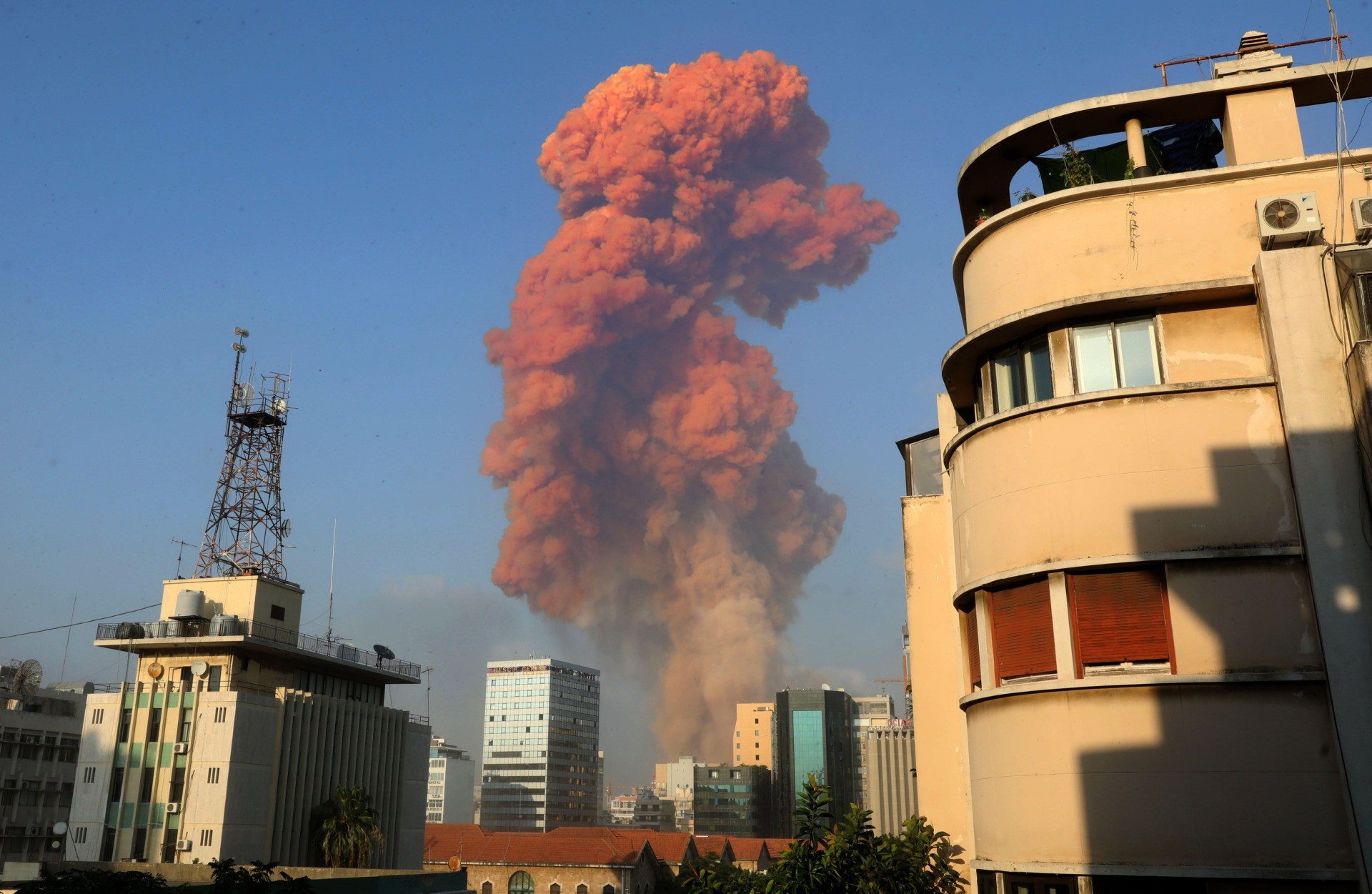
The explosion that rocked Beirut on August 4, 2020, rattled entire buildings and broke glass, was felt in several parts of the city. (ANWAR AMRO/AFP via Getty Images)
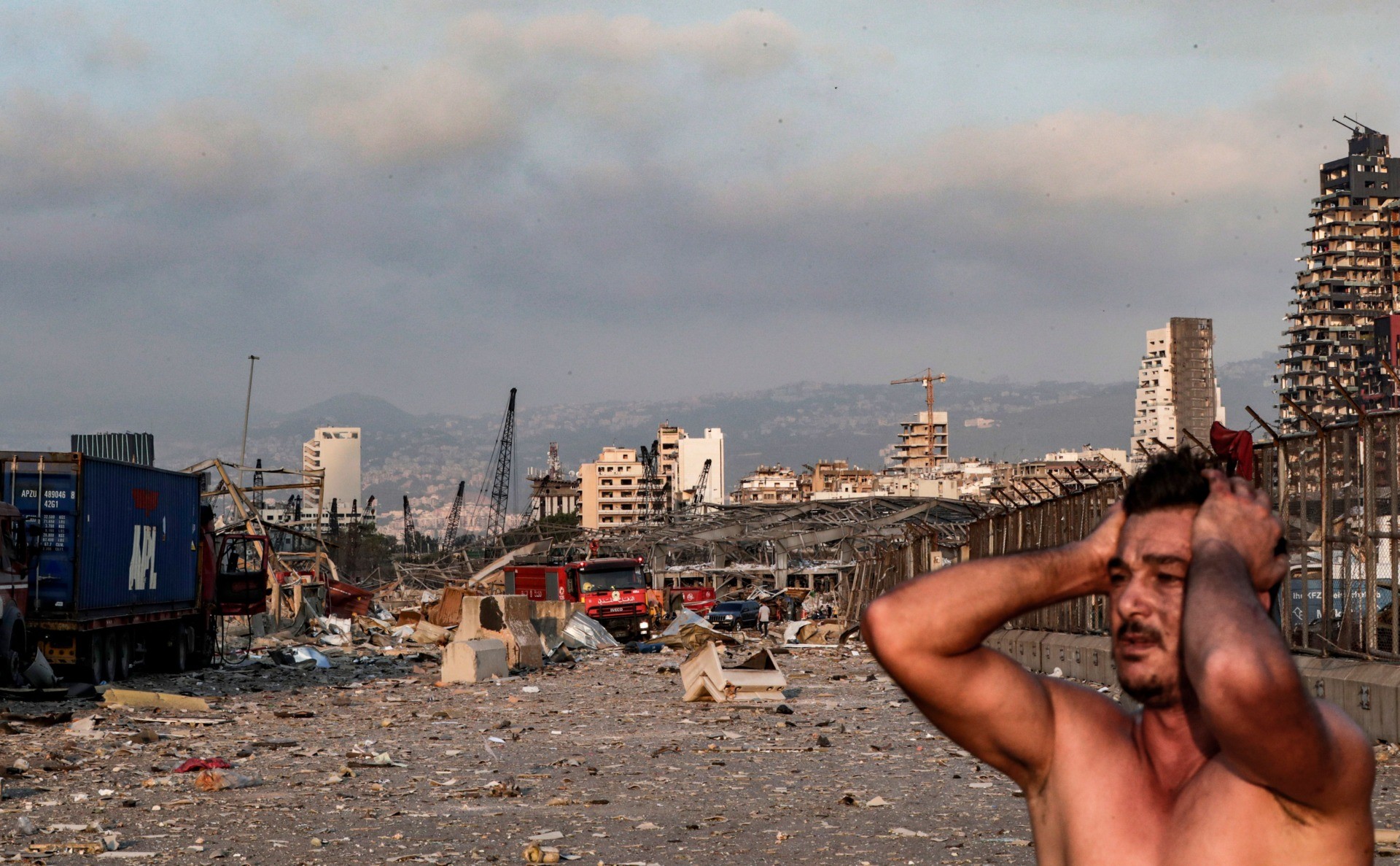
A man reacts at the scene of an explosion at the port in Lebanon’s capital Beirut on August 4, 2020. (IBRAHIM AMRO/AFP via Getty Images)
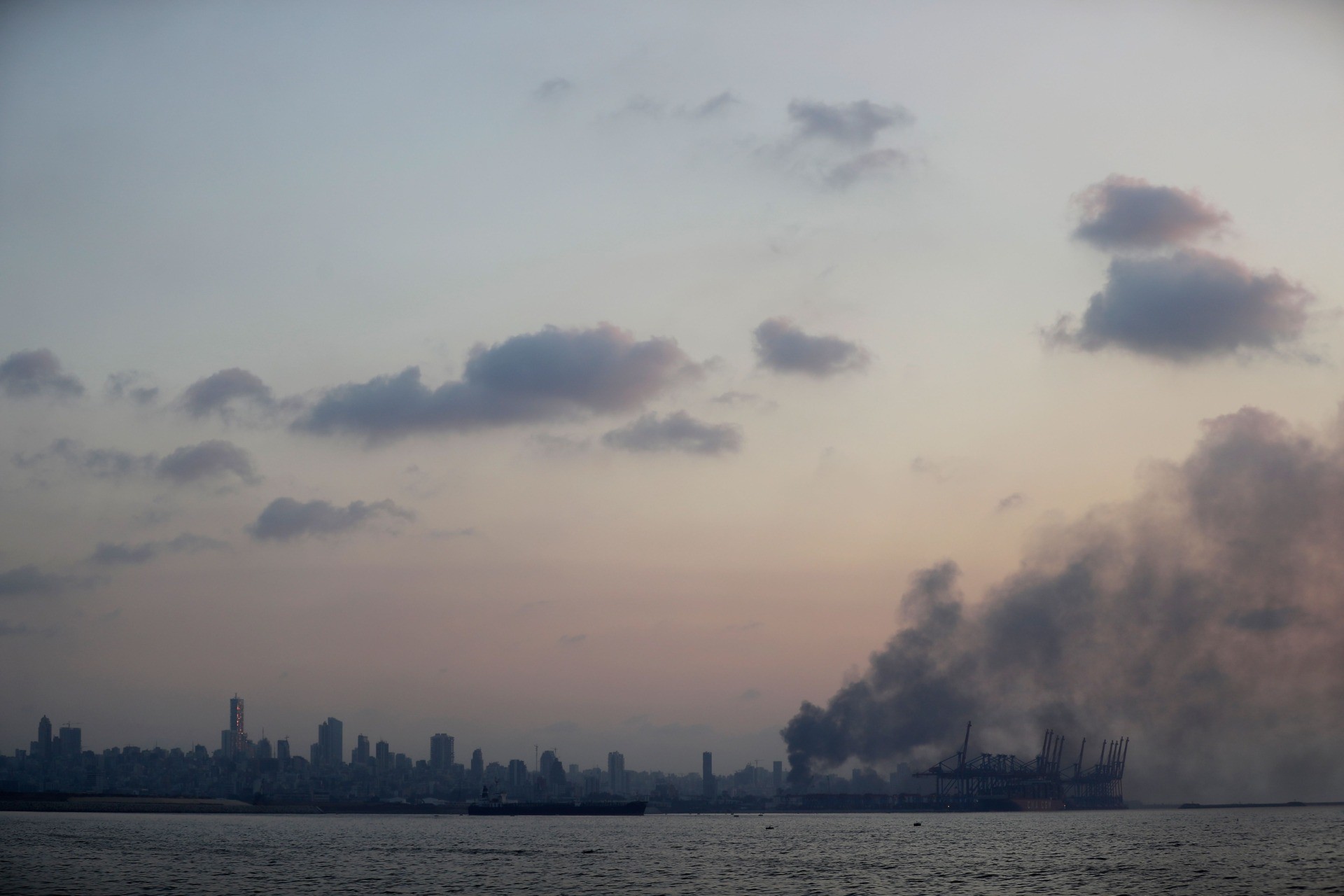
Smoke billows from an explosion in the Lebanese capital Beirut on August 4, 2020. (JOSEPH EID/AFP via Getty Images)
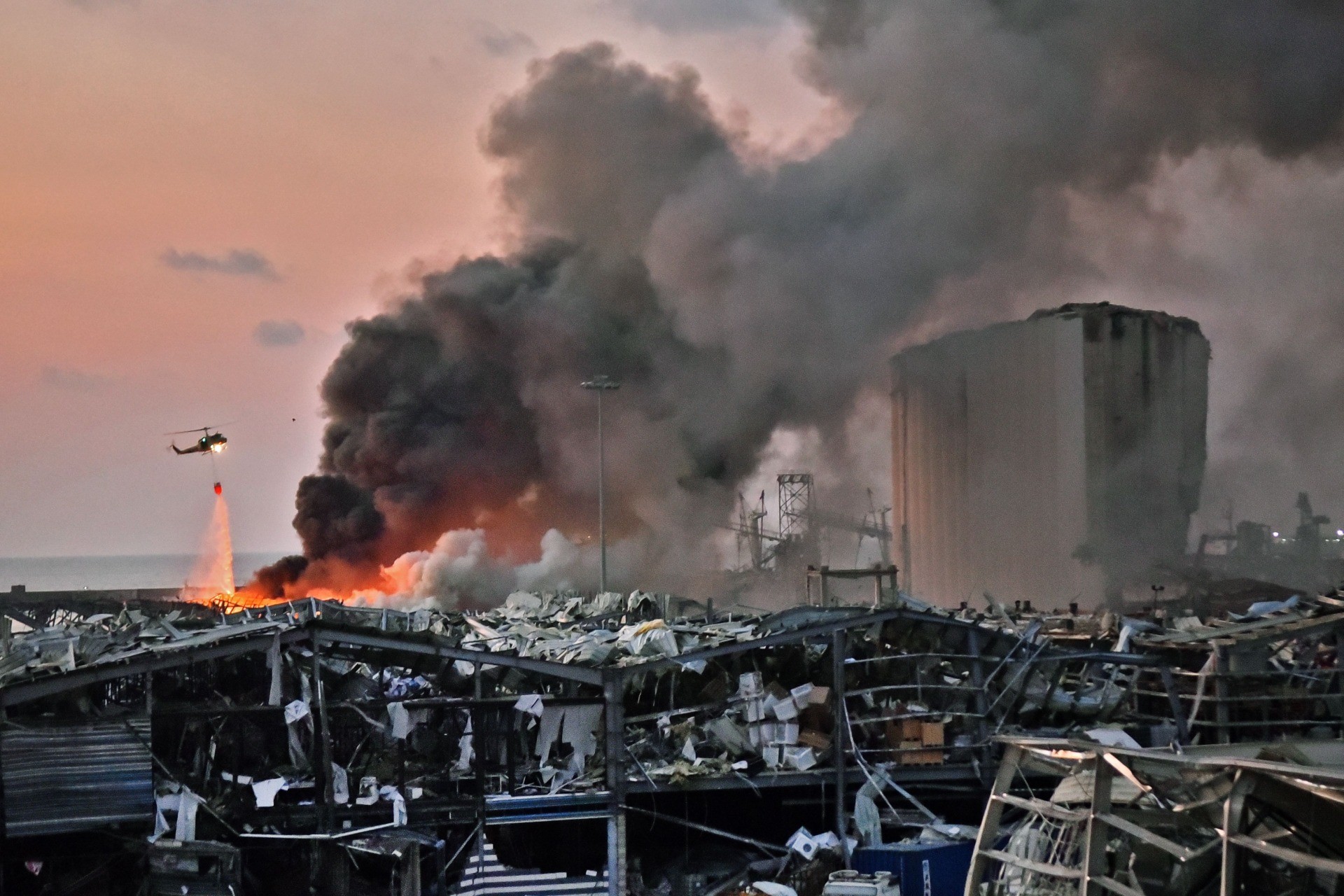
A helicopter puts out a fire at the scene of an explosion at the port of Lebanon’s capital Beirut on August 4, 2020. (STR/AFP via Getty Images)
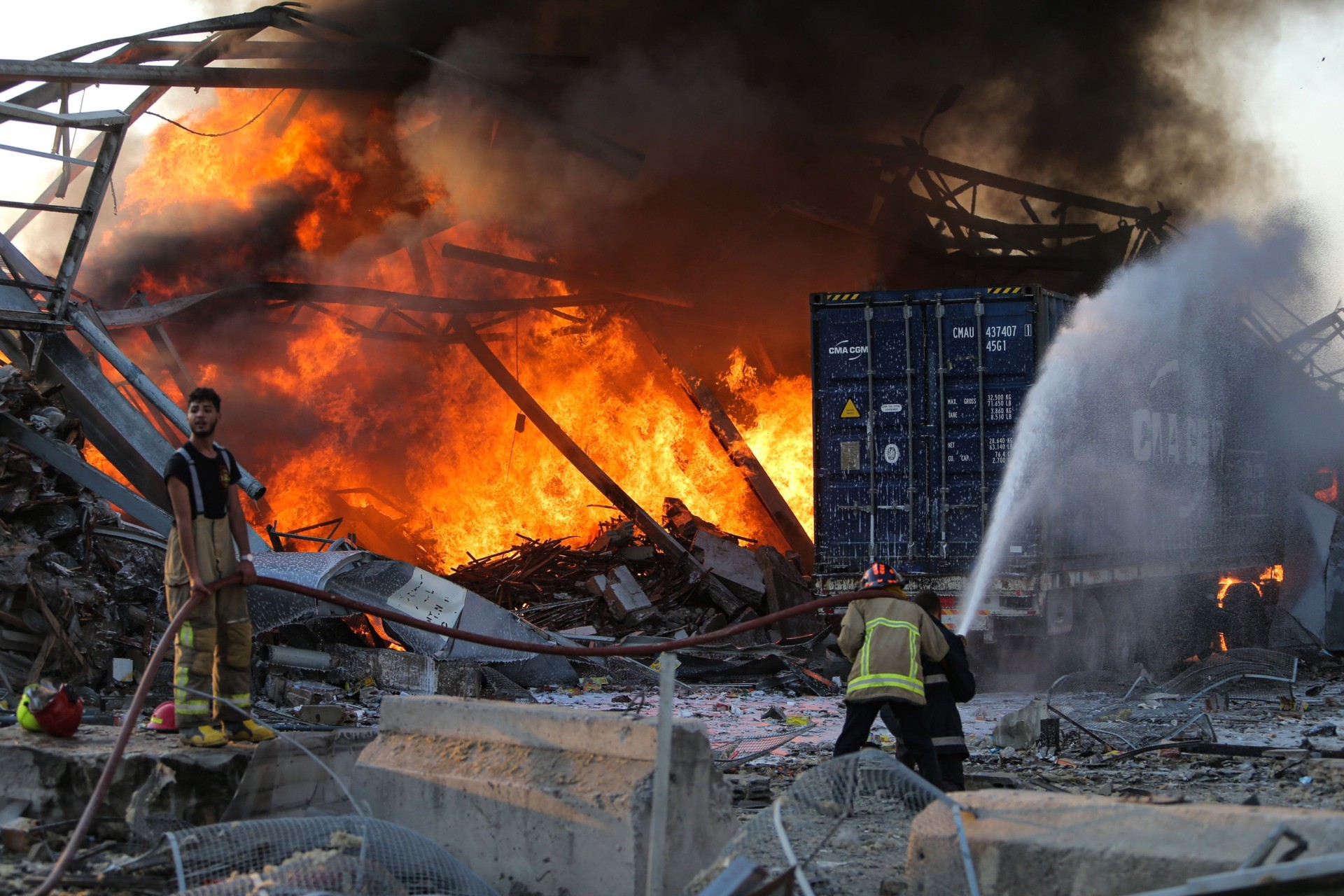
Firefighters douse a blaze at the scene of an explosion at the port of Lebanon’s capital Beirut on August 4, 2020. (STR/AFP via Getty Images)
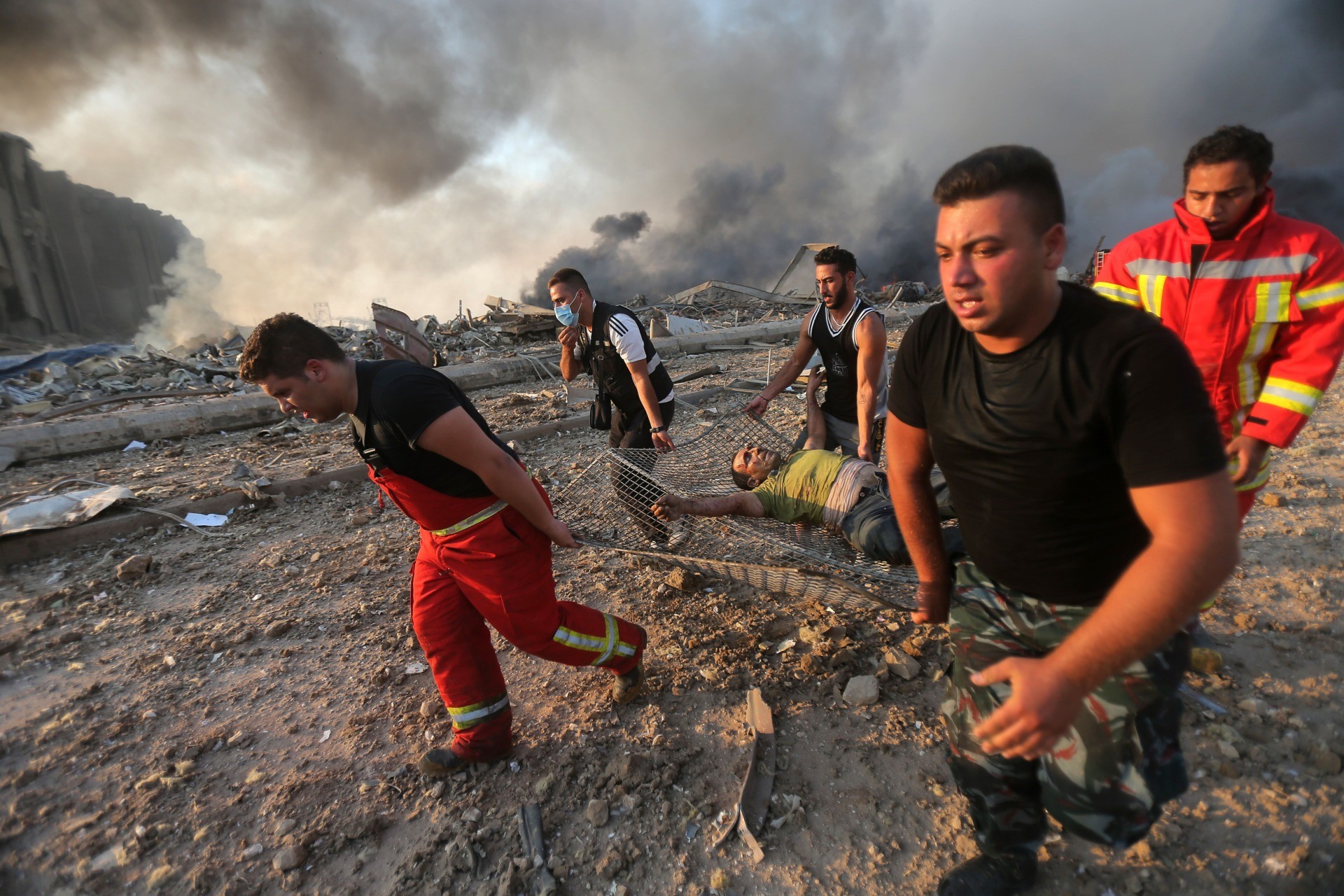
Firefighters evacuate a wounded man from the scene of an explosion at the port in Beirut on August 4, 2020. (ANWAR AMRO/AFP via Getty Images)
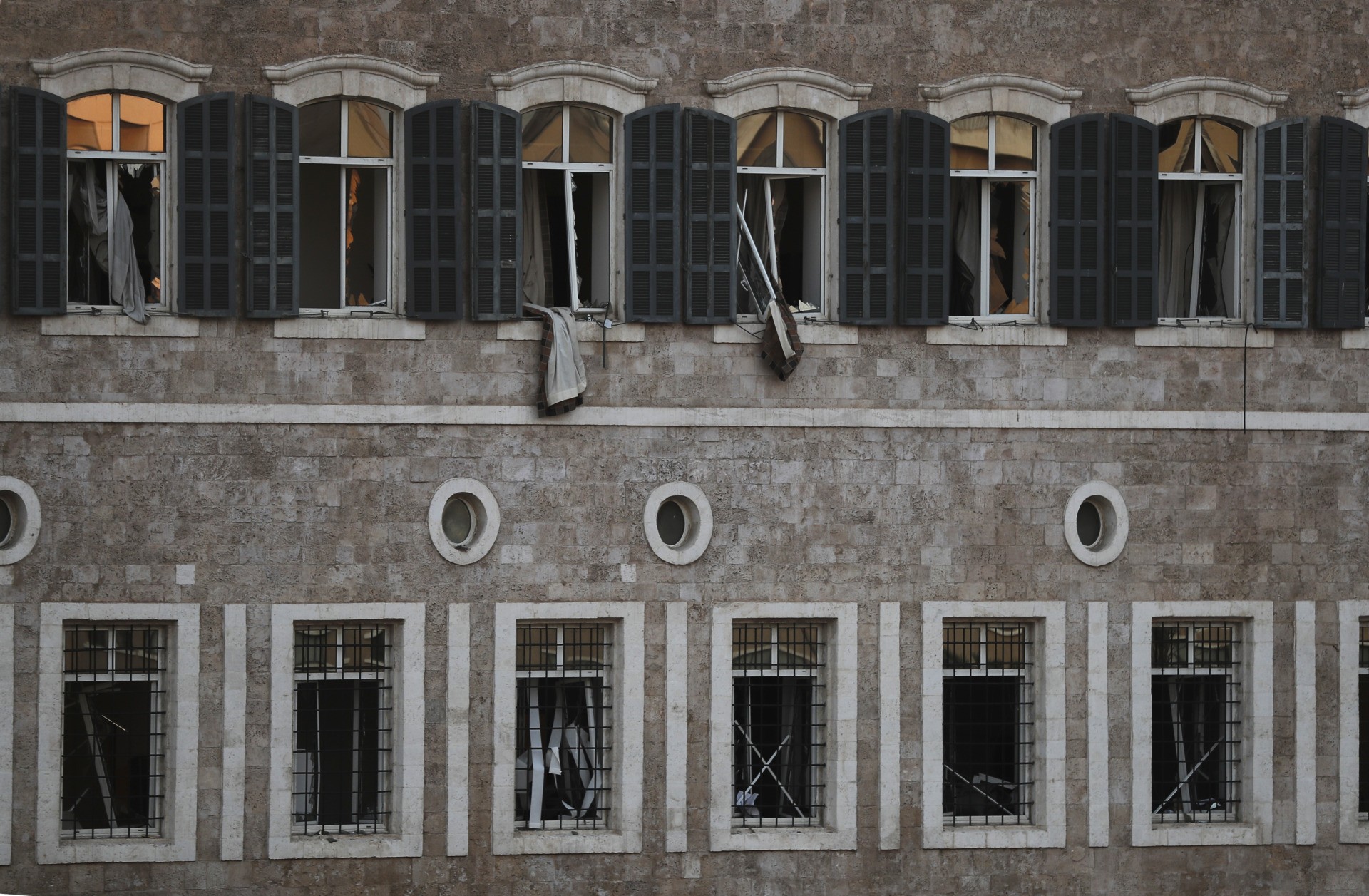
Windows of the Lebanese Government Palace are seen damaged after an explosion hit the seaport of Beirut, Lebanon, Tuesday, Aug. 4, 2020. (AP Photo/Hussein Malla)
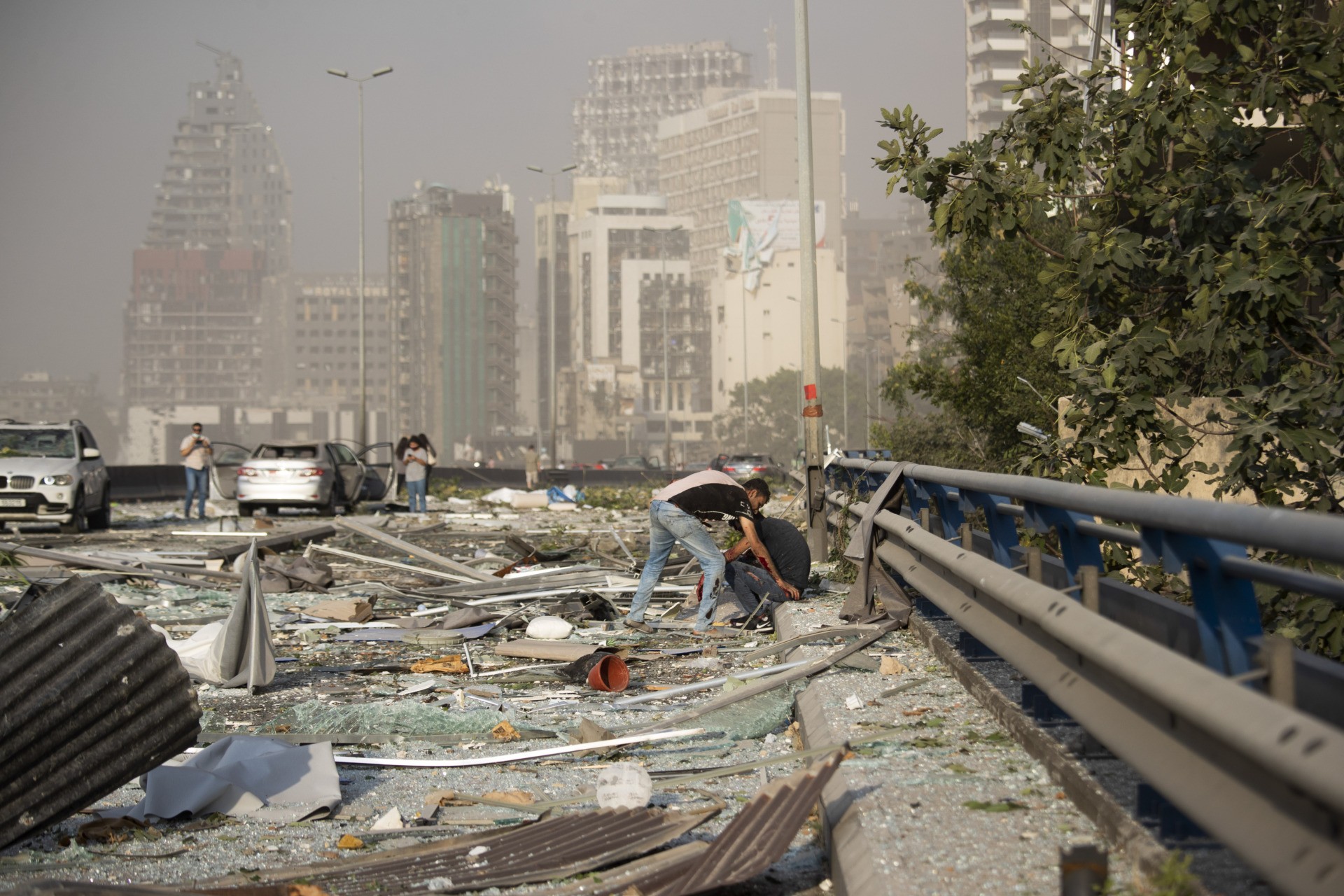
Aftermath of a massive explosion is seen in Beirut, Lebanon, Tuesday, Aug. 4, 2020. The blast flattened much of the port, damaging buildings and blowing out windows and doors as a giant mushroom cloud rose above the capital. Witnesses saw many people injured by flying glass and debris. (AP Photo/Hassan Ammar)
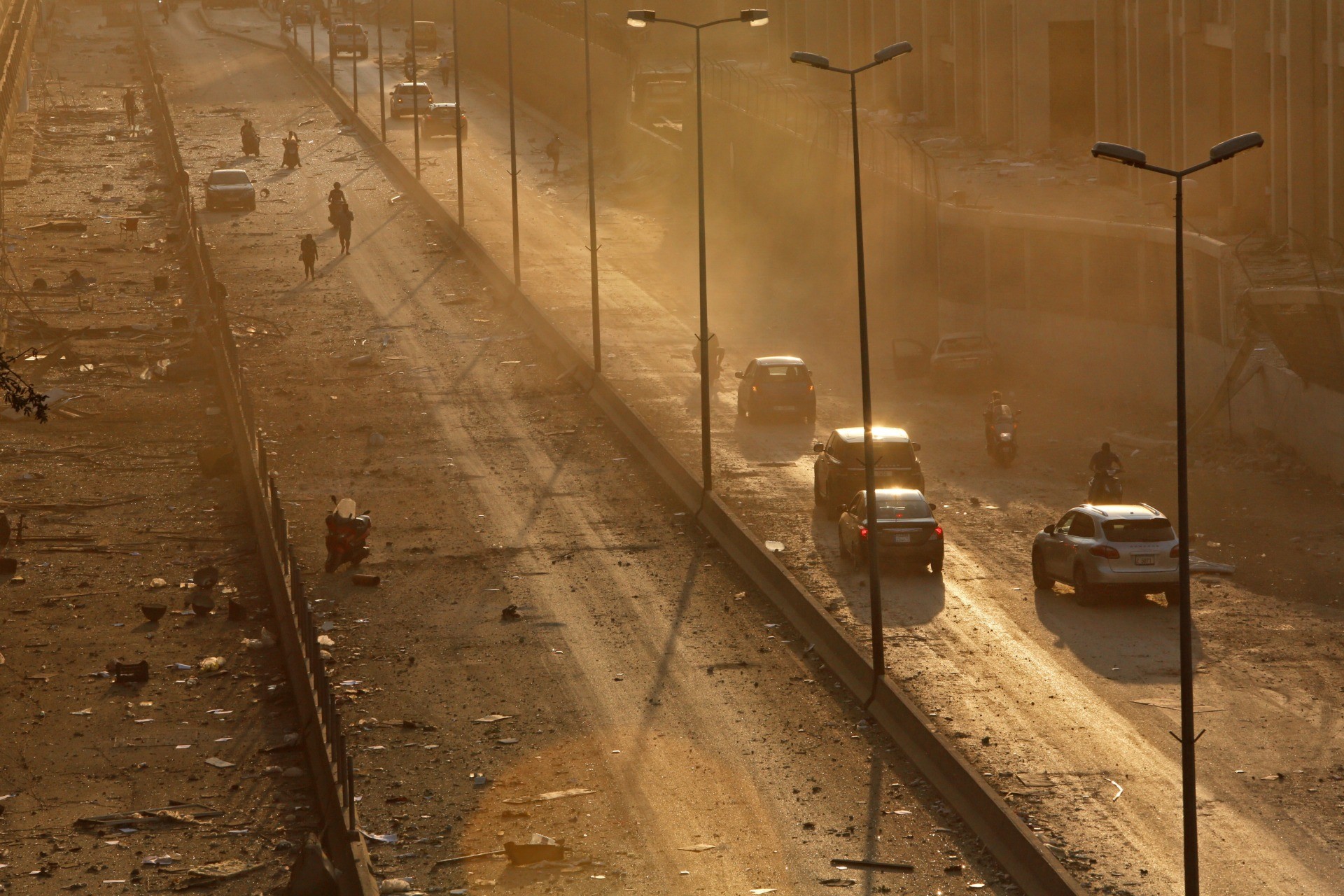
Debris is seen on a main road in Beirut at sunset following the explosion that shook the port of Lebanon’s capital on August 4, 2020. (MARWAN TAHTAH/AFP via Getty Images)
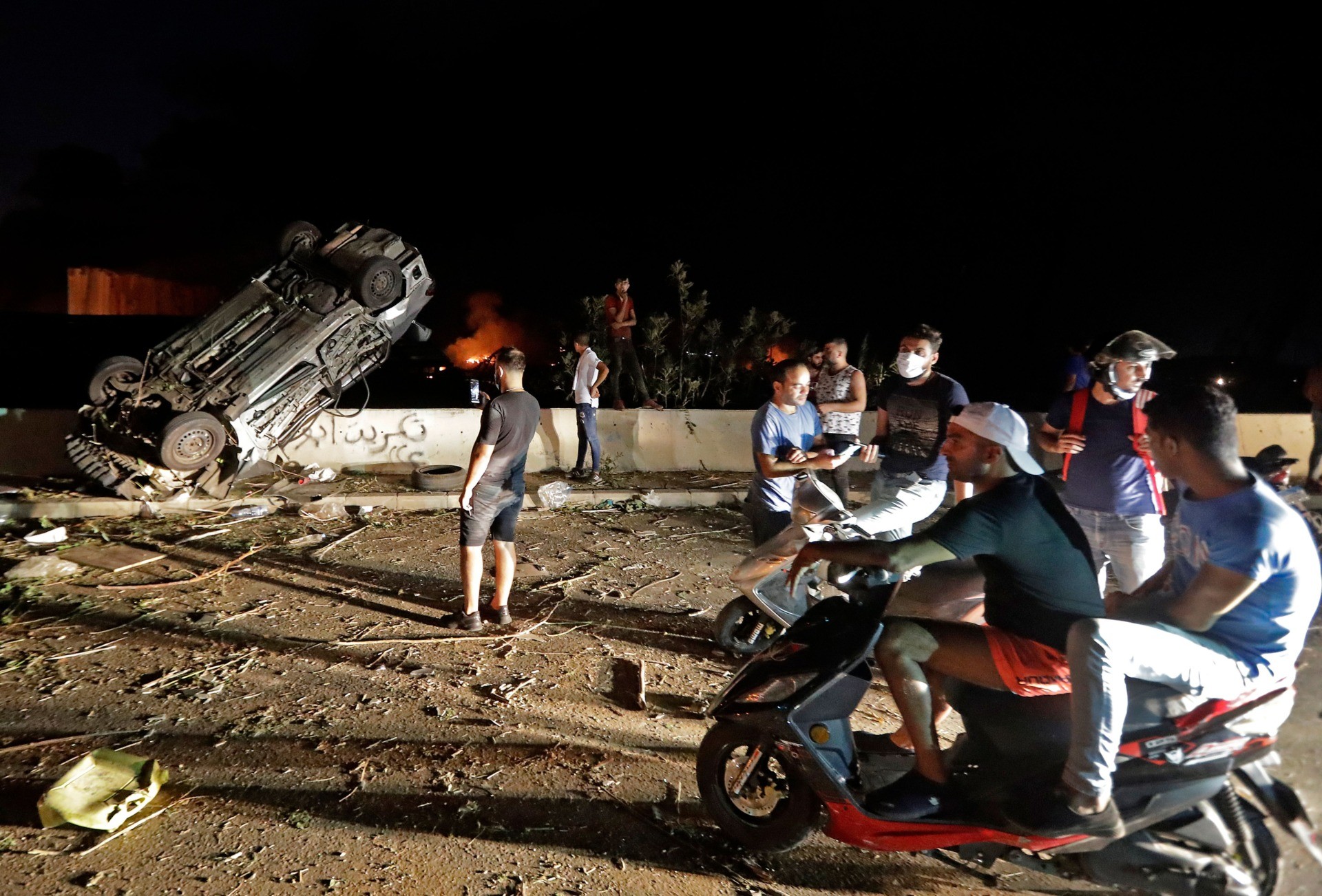
People gather by cars destroyed following an explosion at the port of Lebanon’s capital Beirut on August 4, 2020. (JOSEPH EID/AFP via Getty Images)
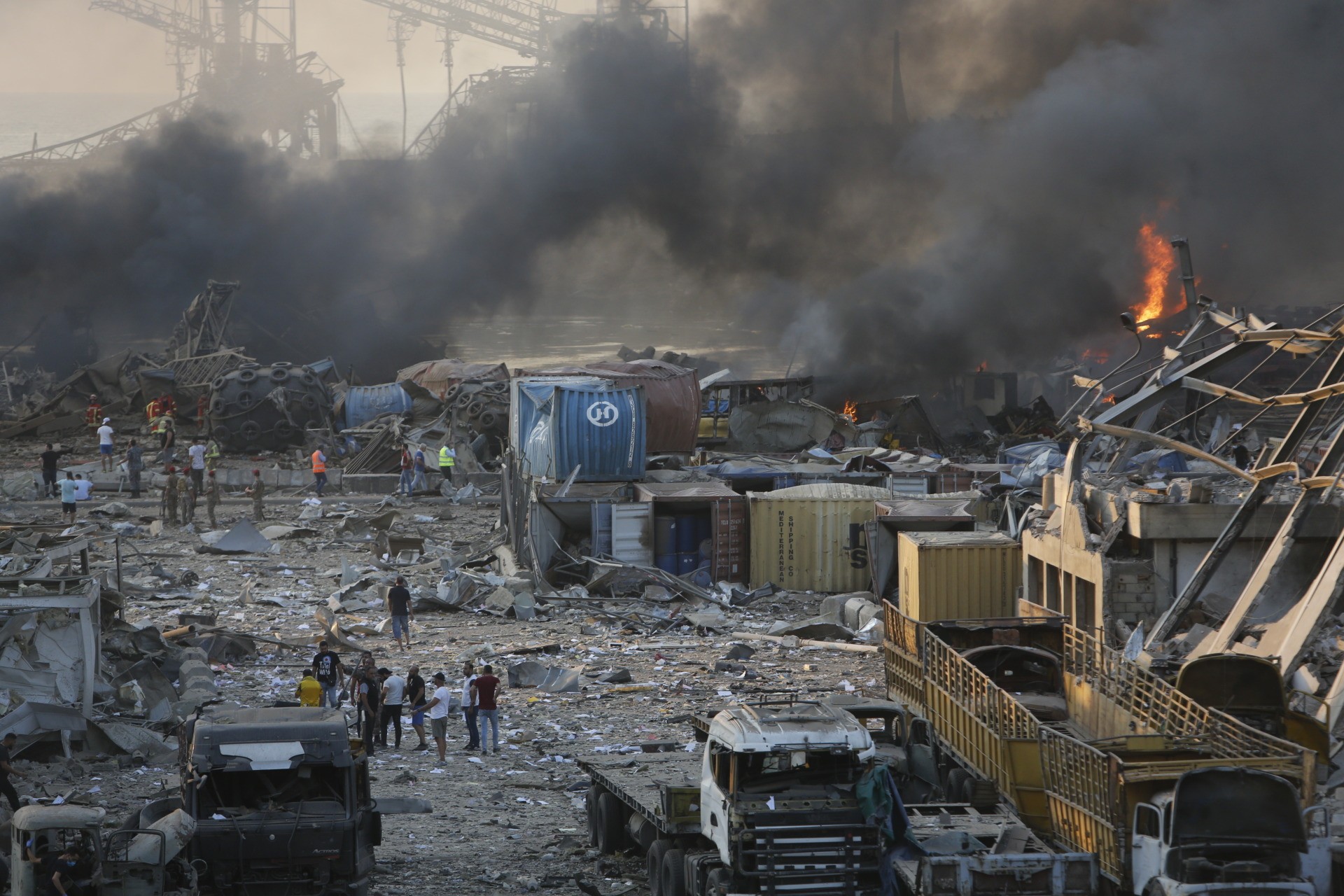
Smoke rises from a port facility after large explosions on August 4, 2020 in Beirut, Lebanon. (Marwan Tahtah/Getty Images)
At a White House press conference Tuesday, President Donald Trump offered his condolences and U.S. assistance to Lebanon.
“Our prayers go out to all the victims and their families,” he said. “The United States stands ready to assist Lebanon.”
“We have a very good relationship with the people of Lebanon, and we will be there to help,” the president said.
“Our team in Beirut has reported to me the extensive damage to a city and a people that I hold dear, an additional challenge in a time of already deep crisis,” U.S. Secretary of State Mike Pompeo said in a written statement.
Democratic presidential candidate Joe Biden tweeted out his support for the people of Lebanon and urged the mobilization of immediate relief.
“Our hearts and prayers are with the people of Lebanon, and the victims of the horrific explosion in Beirut,” Biden said in a tweet. “I urge both the Trump Administration and international community to immediately mobilize assistance to the thousands injured in the blast.”
The blast was stunning even for a city that has endured a 15-year civil war, suicide bombings, foreign bombardments, and political assassinations.
“It was a real horror show. I haven’t seen anything like that since the days of the [civil] war,” said Marwan Ramadan, who was about 500 yards from the port and was knocked off his feet by the force of the explosion.
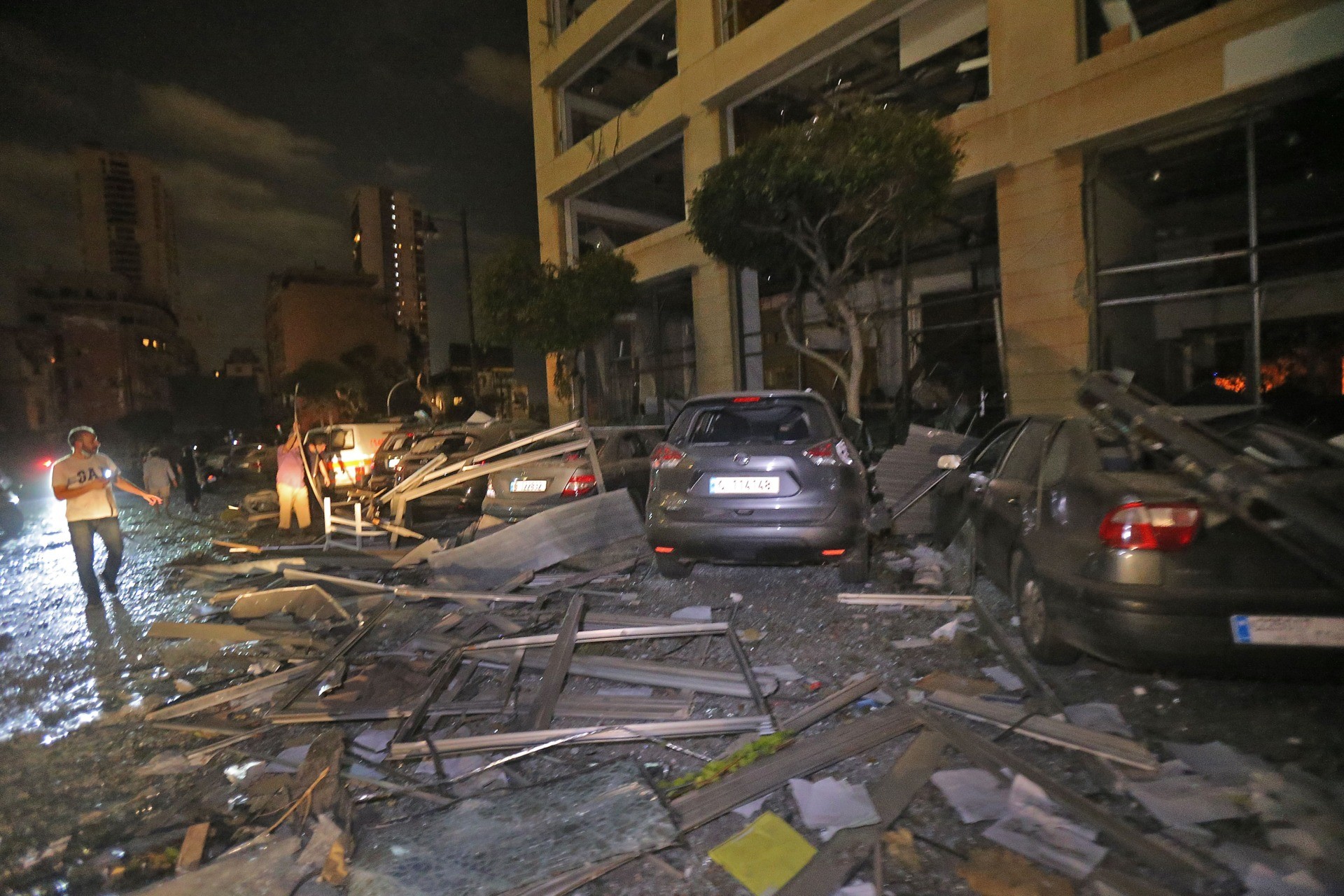
The general view of destruction along a street in the centre of Lebanon’s capital Beirut, following a massive explosion at the nearby port of Beirut. (STR/AFP via Getty Images)
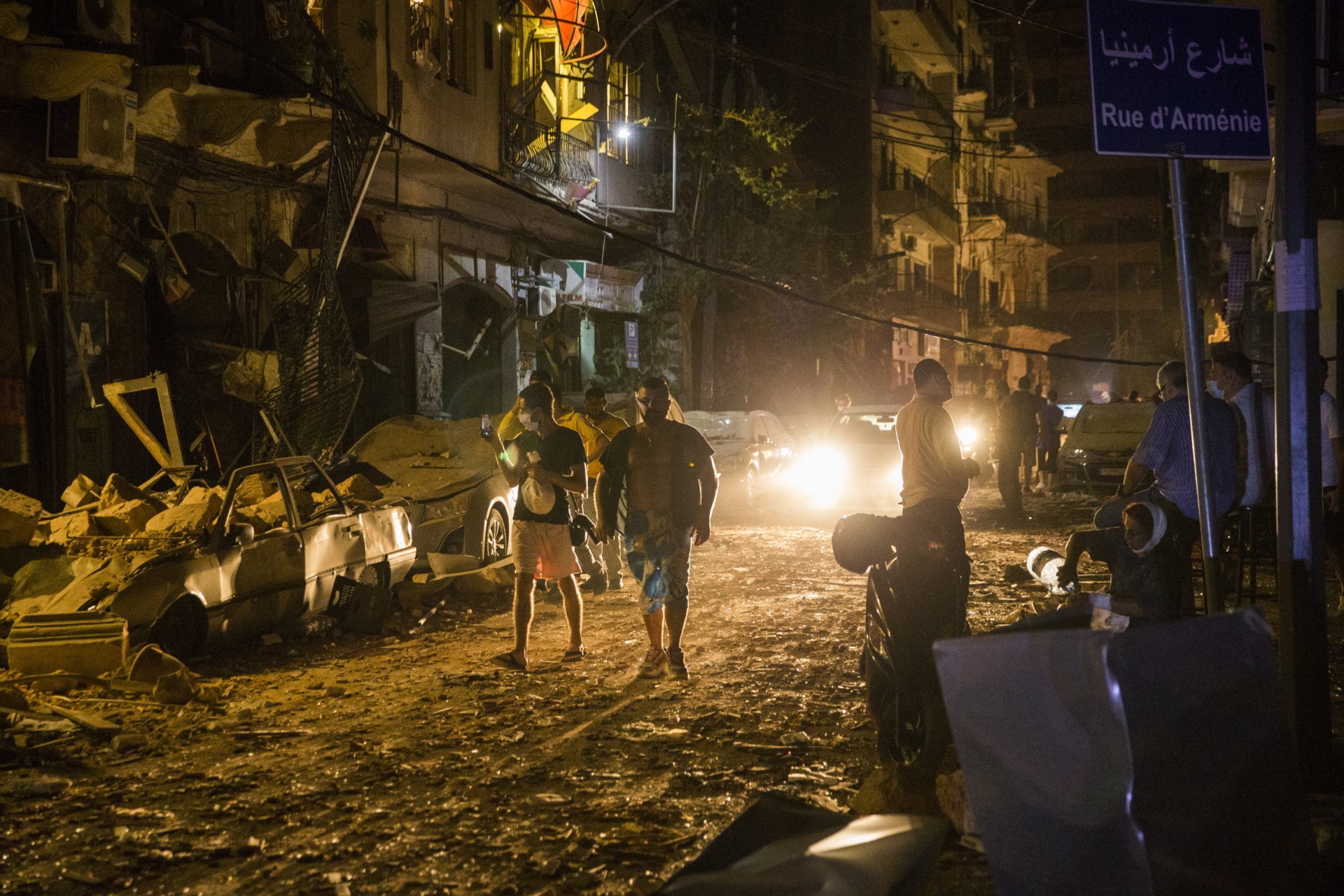
People walk on a street covered in debris after a large explosion on August 4, 2020 in Beirut, Lebanon. (Daniel Carde/Getty Images)
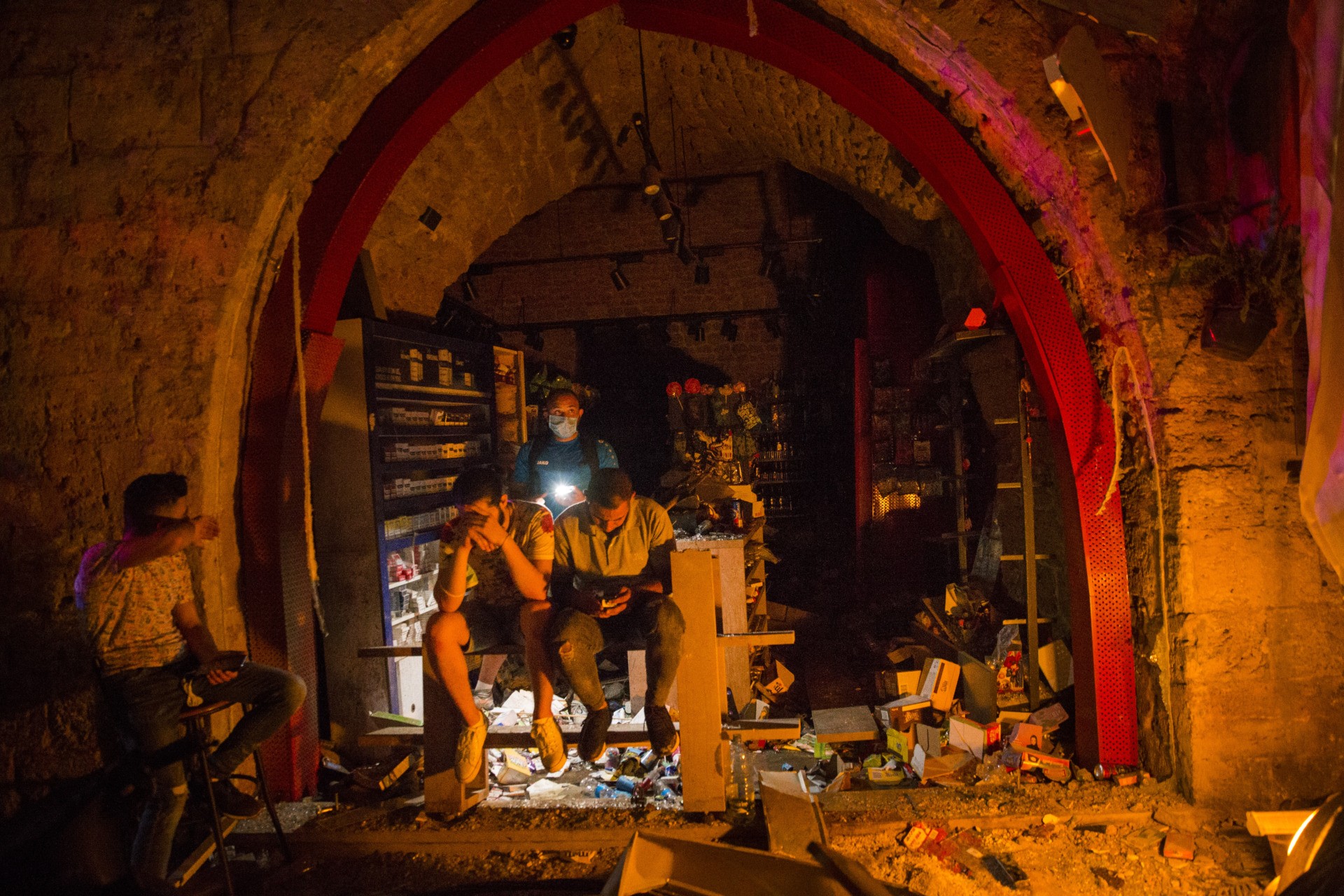
A group of men sit near the entrance of a shop damaged after a large explosion on August 4, 2020 in Beirut, Lebanon. (Daniel Carde/Getty Images)
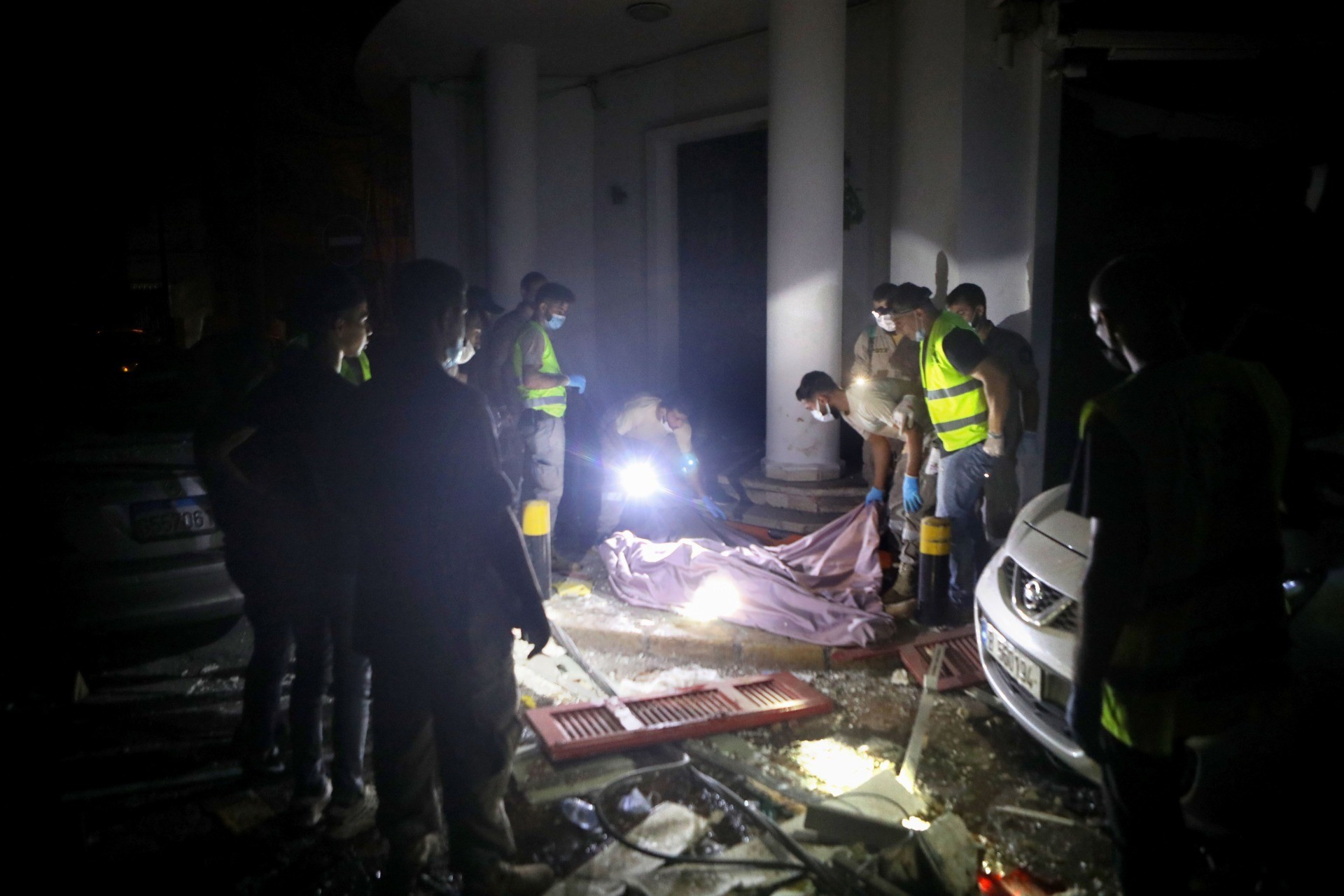
Lebanese rescue workers cover the body of a dead man following an explosion at the port of Beirut on August 4, 2020. (PATRICK BAZ/AFP via Getty Images)
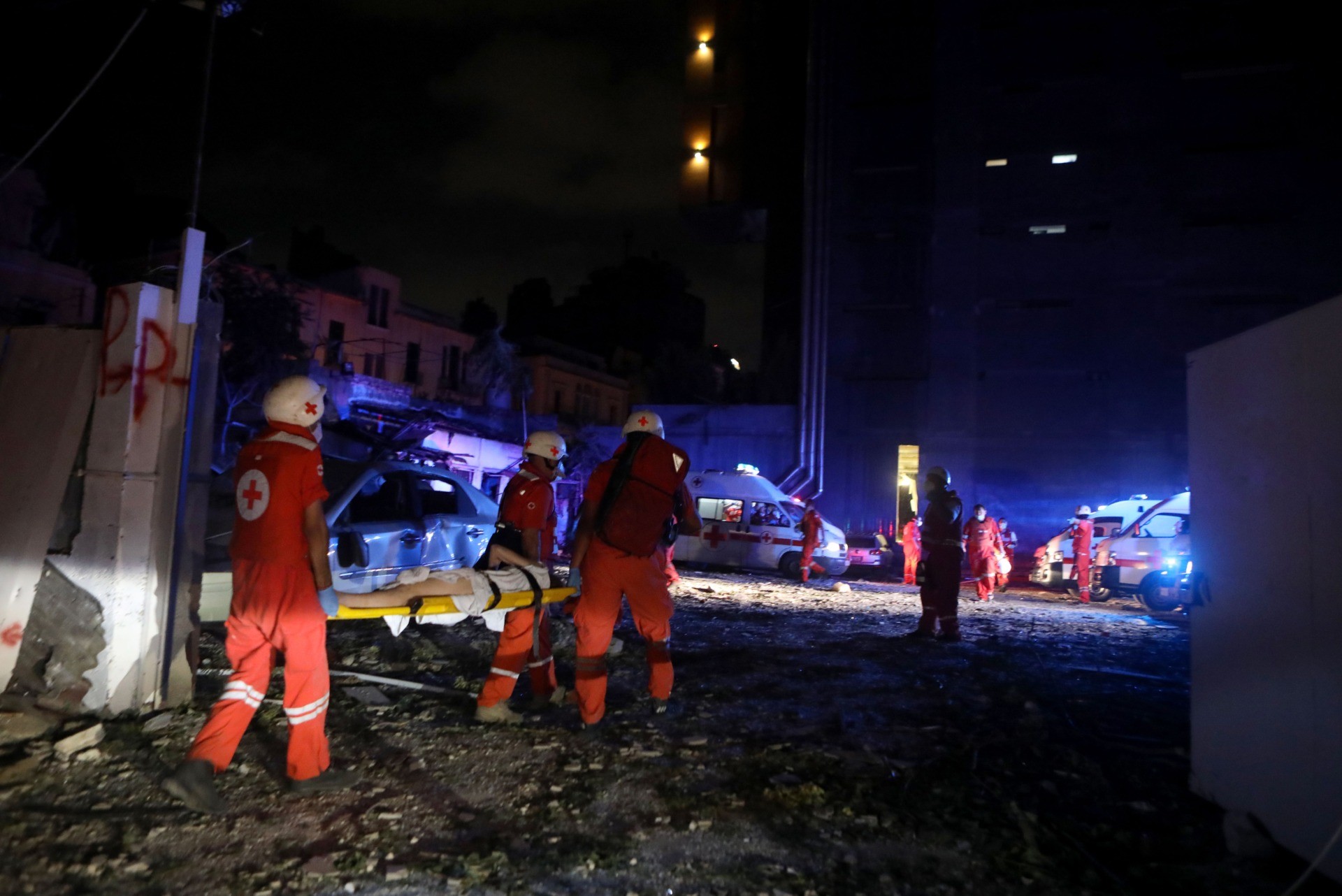
Lebanese Red Cross officers carry an injured woman following an explosion at the port of Beirut on August 4, 2020. (PATRICK BAZ/AFP via Getty Images)
The sudden devastation overwhelmed a country already struggling with both the coronavirus pandemic and a severe economic and financial crisis. For hours after the explosion ambulances rushed in from around the country to carry away the wounded. Hospitals quickly filled beyond capacity, pleading for blood supplies, and generators to keep their lights on.
Several of Beirut’s hospitals were damaged in the blast. Outside the St. George University Hospital in Beirut’s Achrafieh neighborhood, people with various injuries arrived in ambulances, in cars, and on foot. The explosion had caused major damage inside the building and knocked out the electricity. Dozens of injured were being treated on the spot on the street outside, on stretchers and wheelchairs.
Outside one hospital, Omar Kinno sat on the pavement, holding back tears. Kinno, a Syrian, said one of his sisters was killed when the blast rocked their apartment near the port, and another sister’s neck was broken. His injured mother and father were taken to a hospital, but he didn’t know which, and he was making calls trying to track them down.
“I have no idea what happened to my parents. I am totally lost,” he said.
Confusion reigned across the city, as people cleared out of damaged homes or tried to locate family. Motorcyclists picked their way through traffic, carrying the injured.
One woman covered in blood from the waist up walked down a trashed street while talking furiously on her phone. On another street, a woman with a bloodied face looked distraught, staggering through traffic with two friends at her side.
“This country is cursed,” a young man passing by muttered.
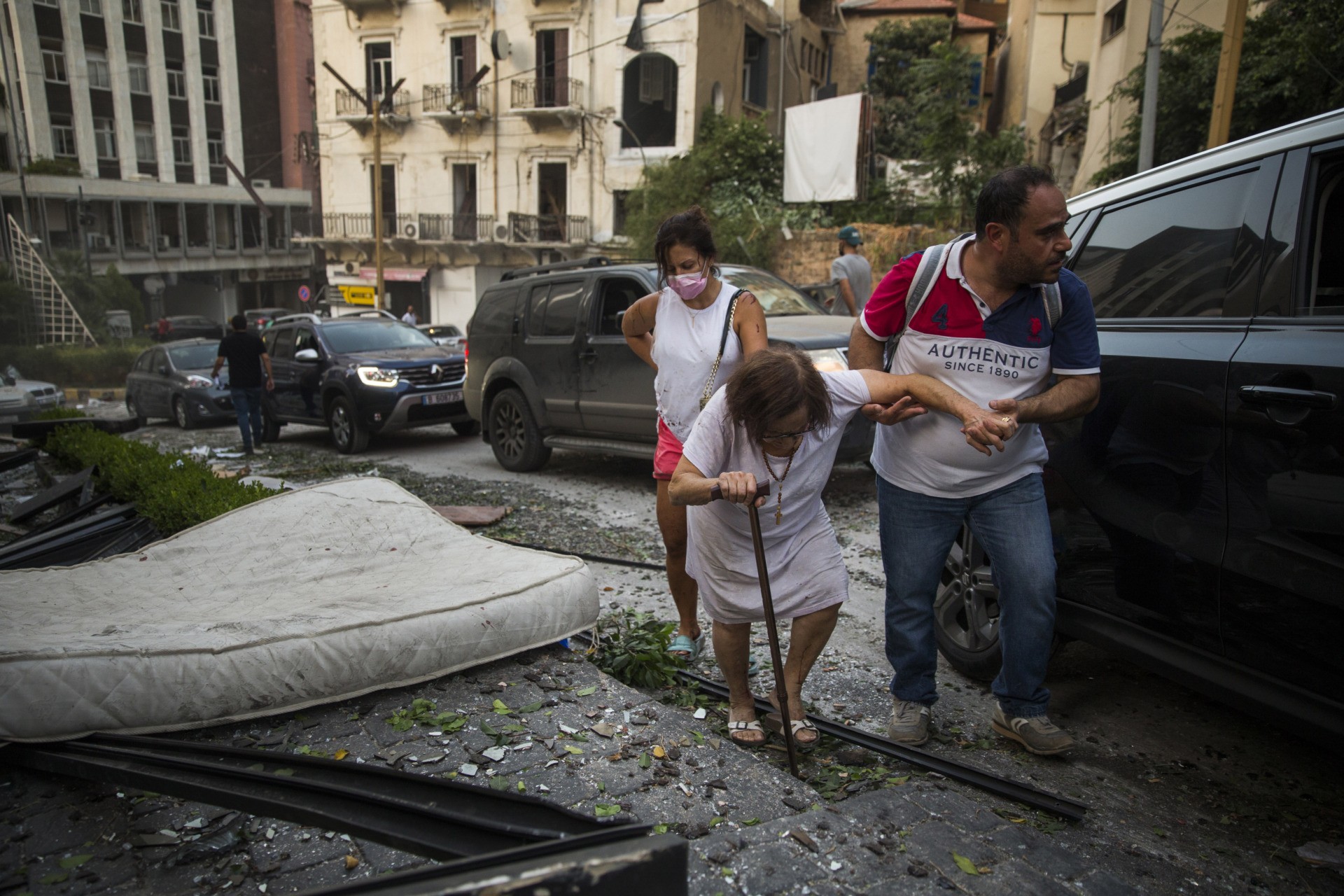
An elderly woman is helped while walking through debris after a large explosion on August 4, 2020 in Beirut, Lebanon. (Daniel Carde/Getty Images)
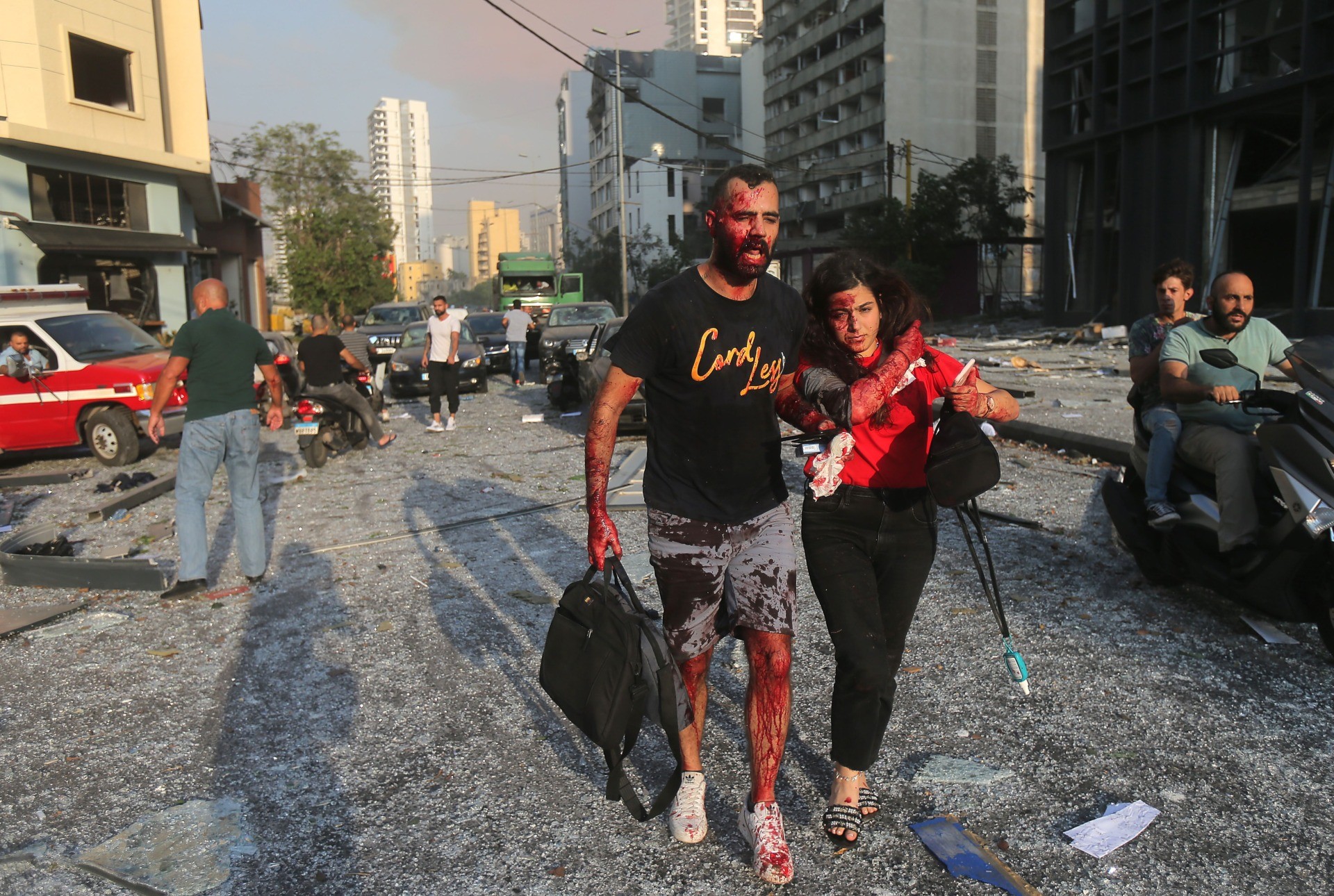
Wounded people walk near the site of an explosion at the port in the Lebanese capital Beirut on August 4, 2020. (STR/AFP via Getty Images)
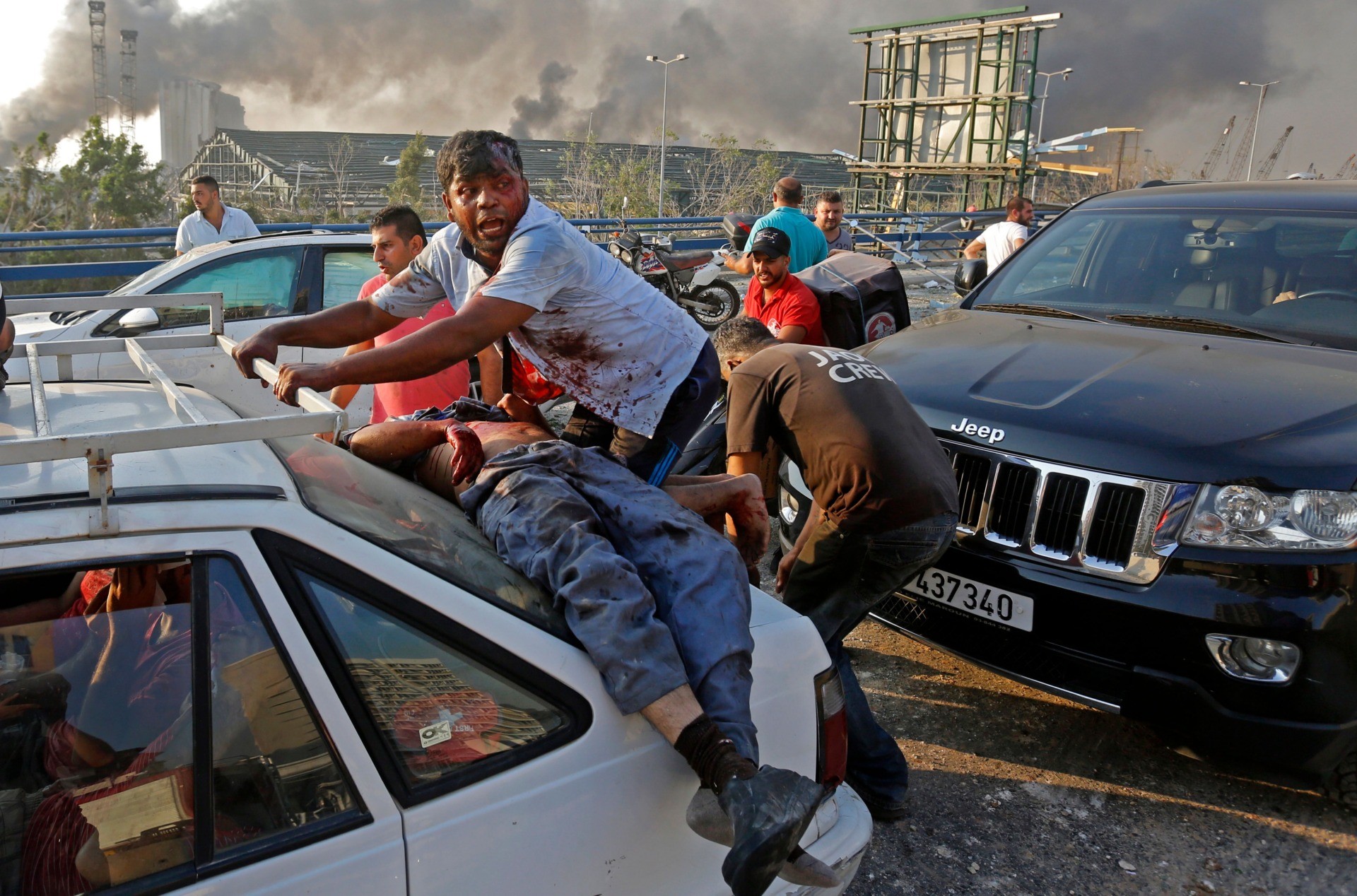
An injured man lies at the back of a car before being rushed away from the scene of a massive explosion at the port of Lebanon’s capital Beirut on August 4, 2020. (MARWAN TAHTAH/AFP via Getty Images)
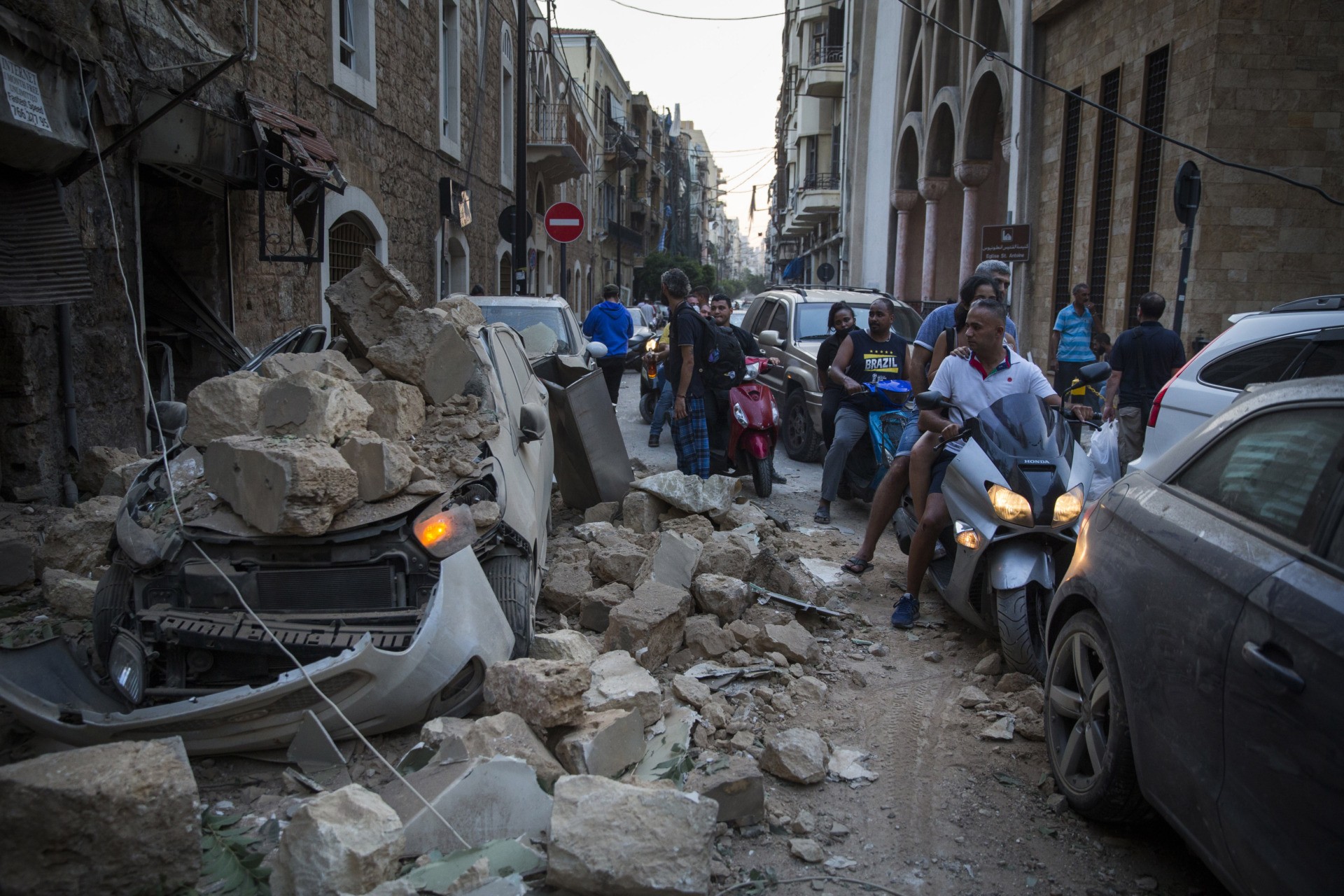
People ride past a car destroyed after a building wall collapsed after a large explosion on August 4, 2020 in Beirut, Lebanon. (Daniel Carde/Getty Images)
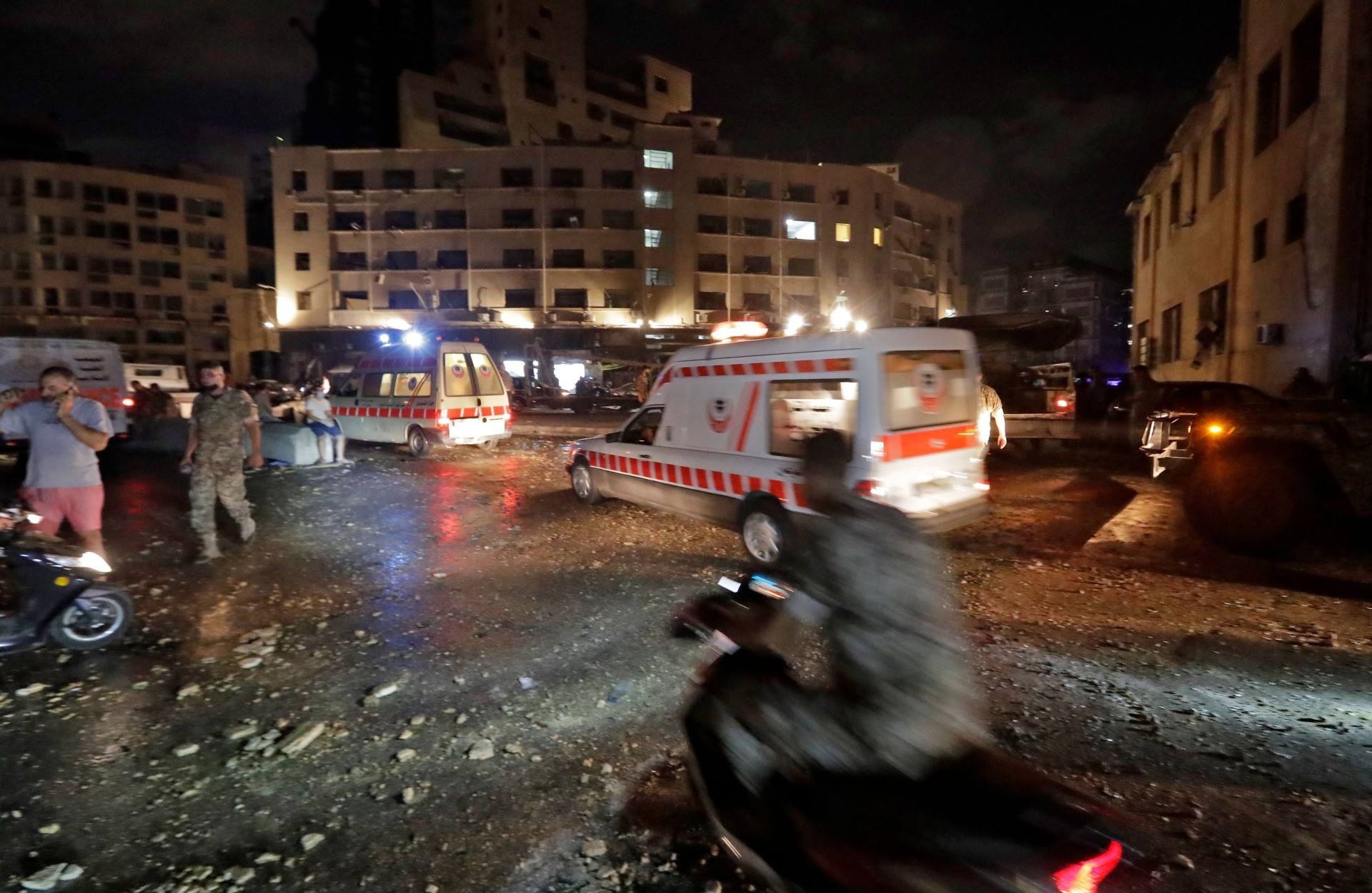
Ambulances gather at the scene of an explosion at the port of Lebanon’s capital Beirut on August 4, 2020. (JOSEPH EID/AFP via Getty Images)
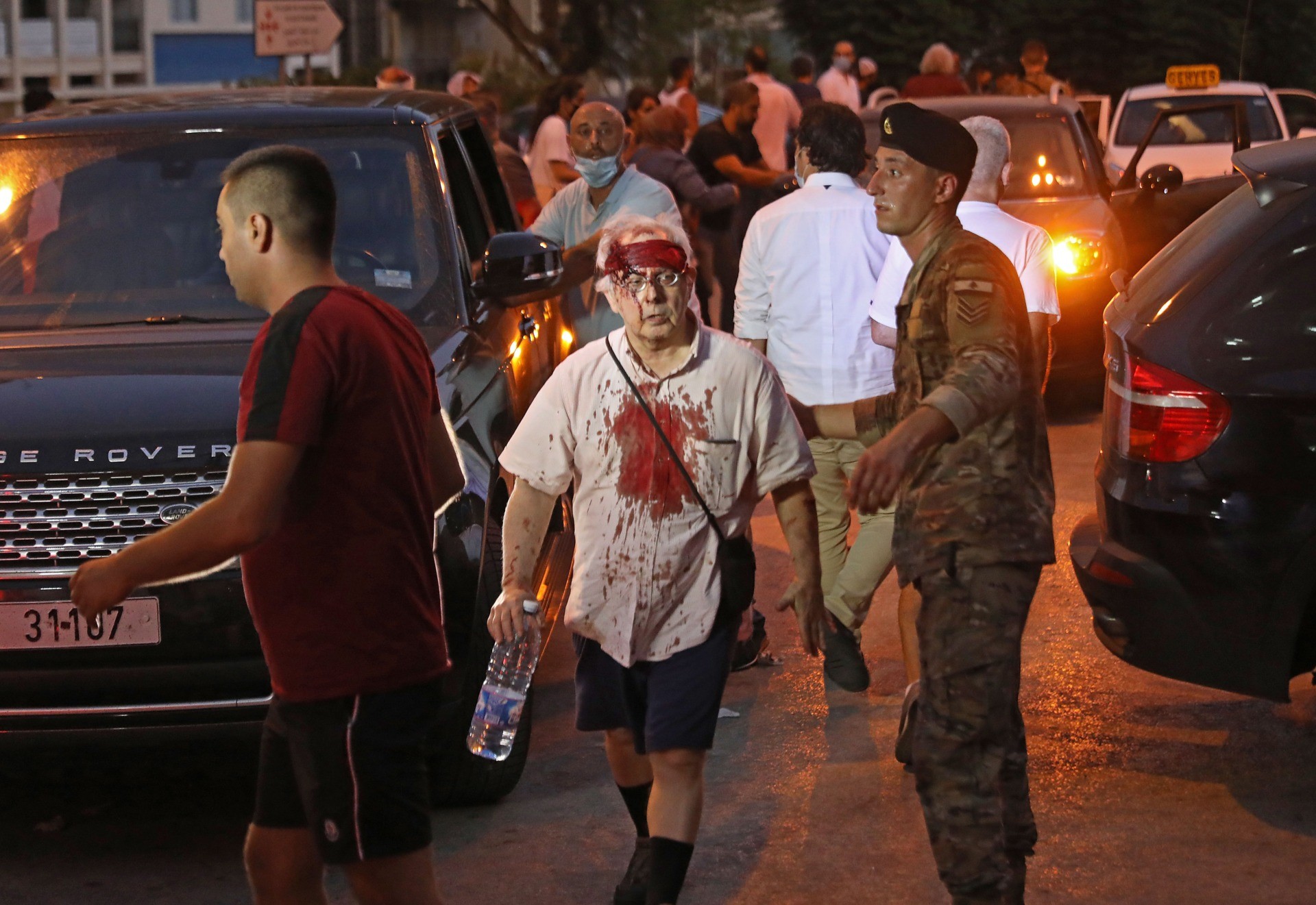
A wounded man walks outside a hospital following an explosion near the port in the Lebanese capital Beirut on August 4, 2020. (IBRAHIM AMRO/AFP via Getty Images)
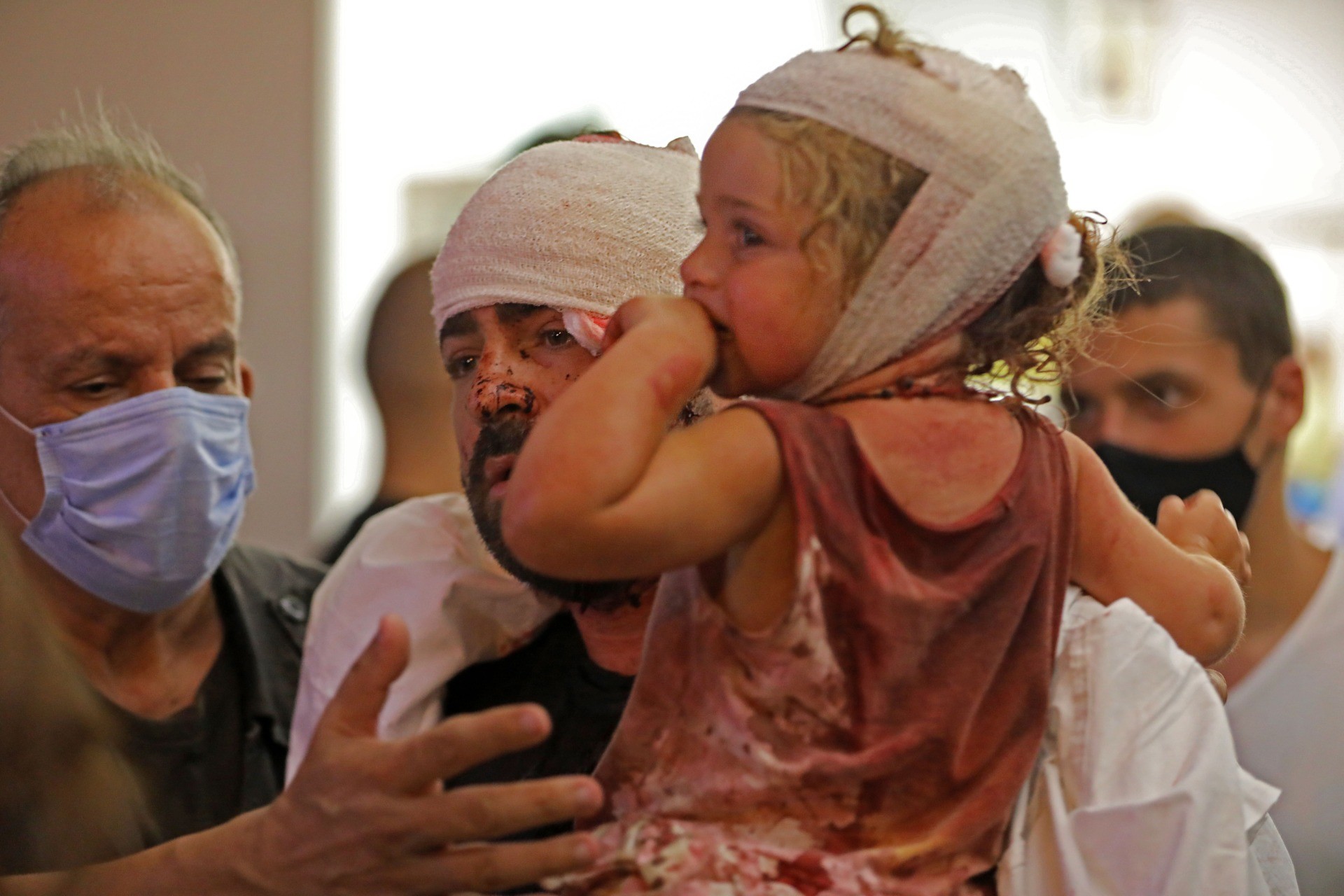
Wounded people are treated at a hospital following an explosion near the port in the Lebanese capital Beirut on August 4, 2020. (IBRAHIM AMRO/AFP via Getty Images)
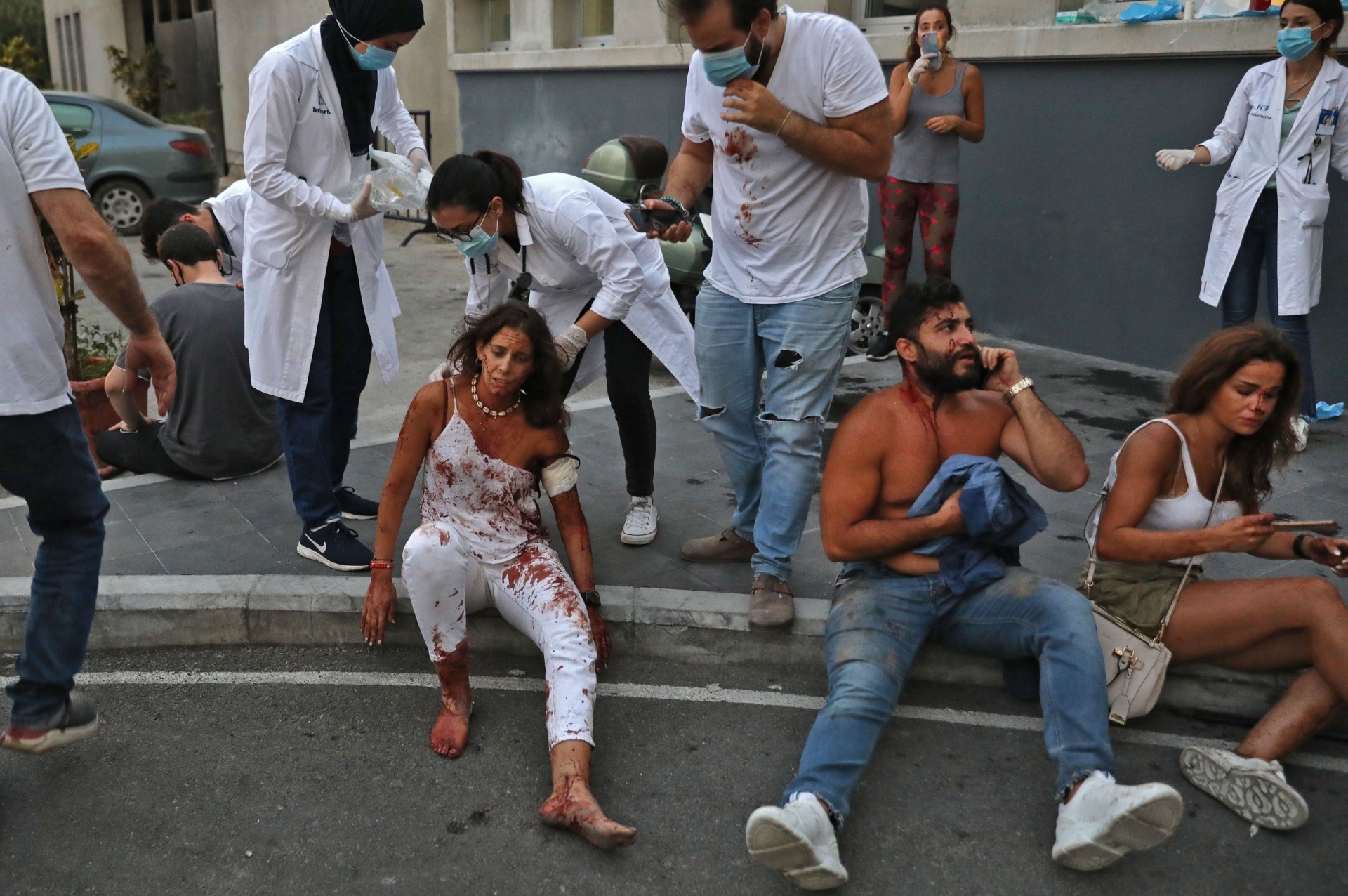
Wounded people are pictured outside a hospital following an explosion in the Lebanese capital Beirut on August 4, 2020. (IBRAHIM AMRO/AFP via Getty Images)
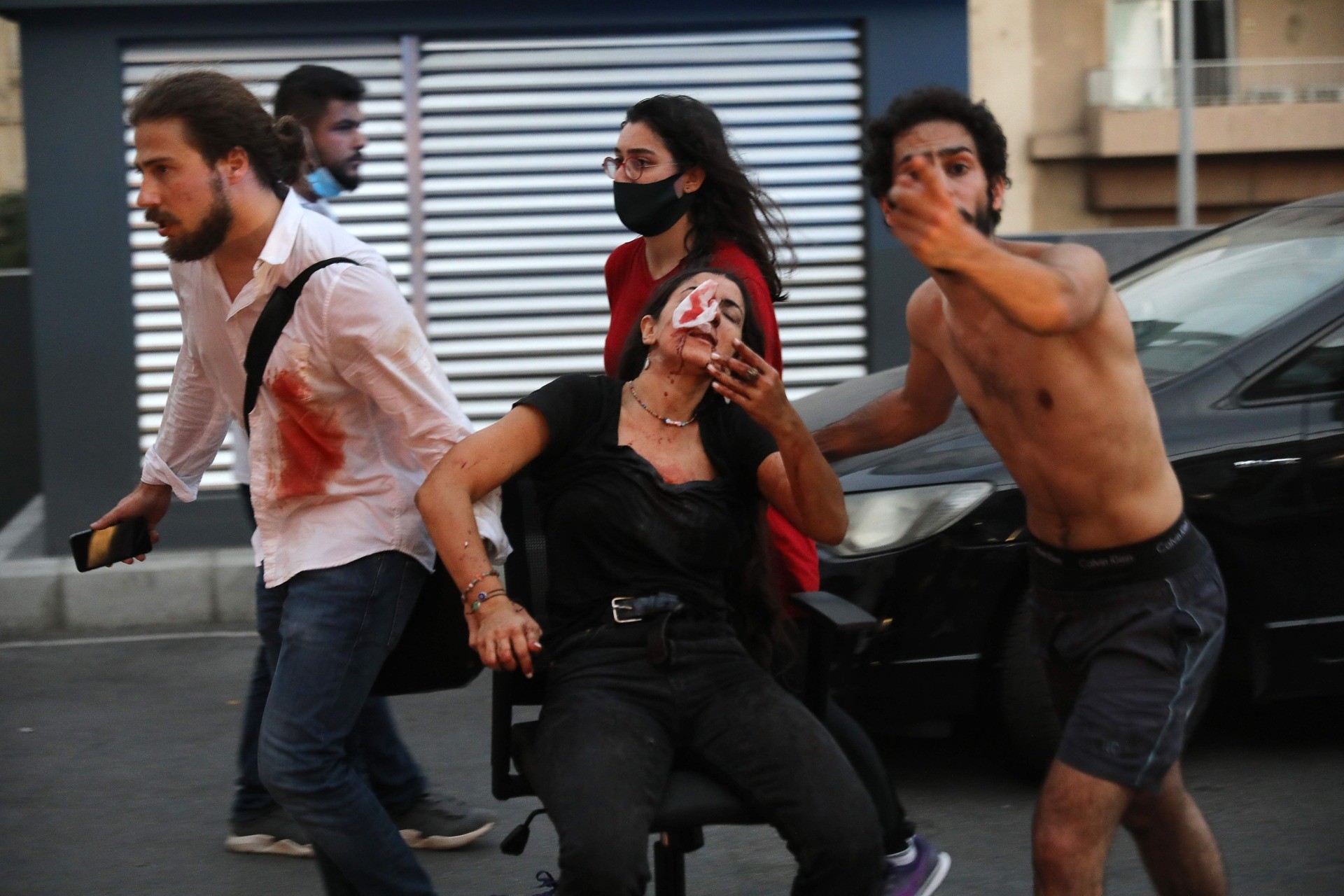
Wounded people are pictured outside a hospital following an explosion in the Lebanese capital Beirut on August 4, 2020. (IBRAHIM AMRO/AFP via Getty Images)
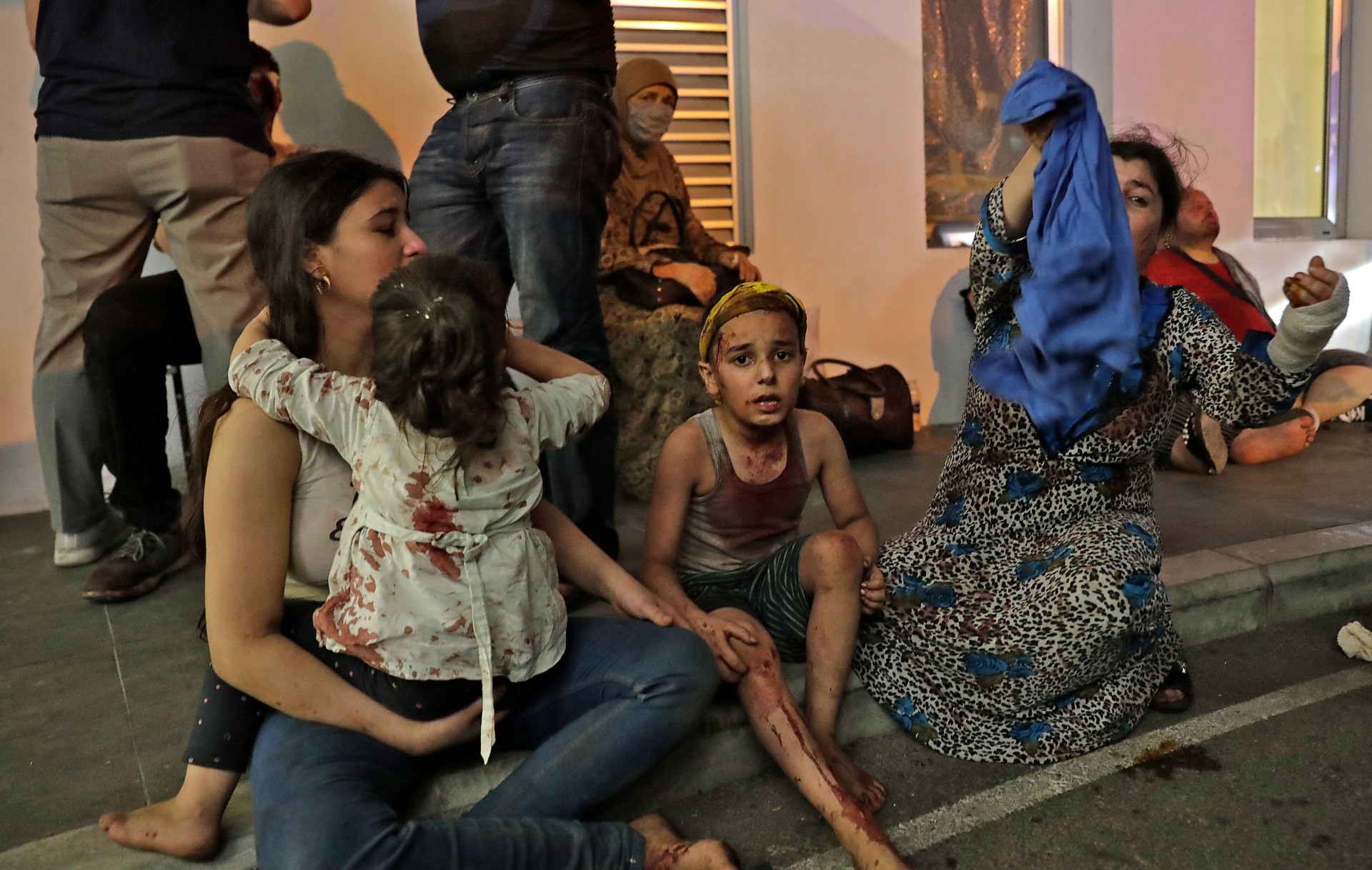
Wounded people wait to received help outside a hospital following an explosion in the Lebanese capital Beirut on August 4, 2020. (IBRAHIM AMRO/AFP via Getty Images)
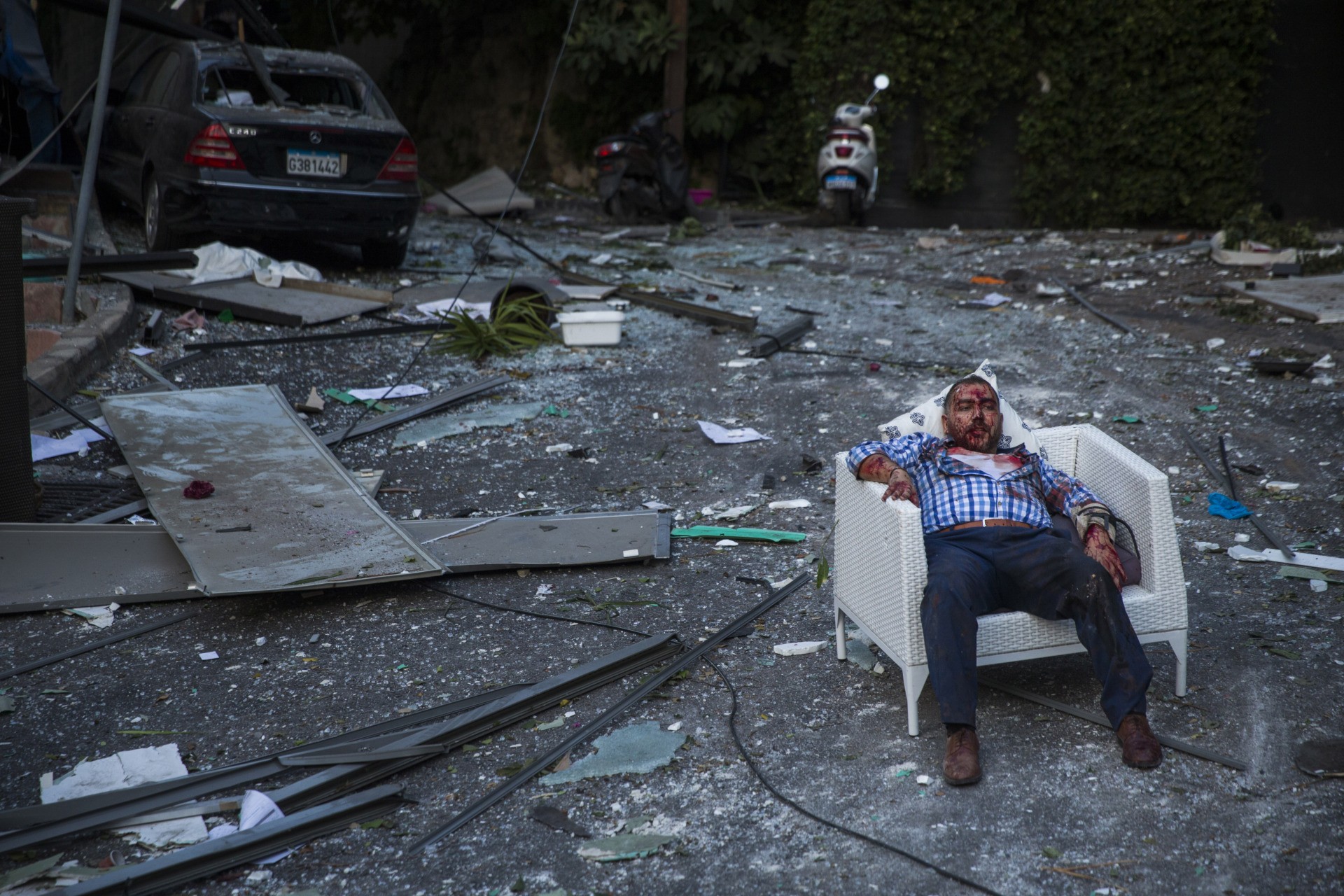
An injured man rests in a chair after a large explosion on August 4, 2020 in Beirut, Lebanon. (Daniel Carde/Getty Images)
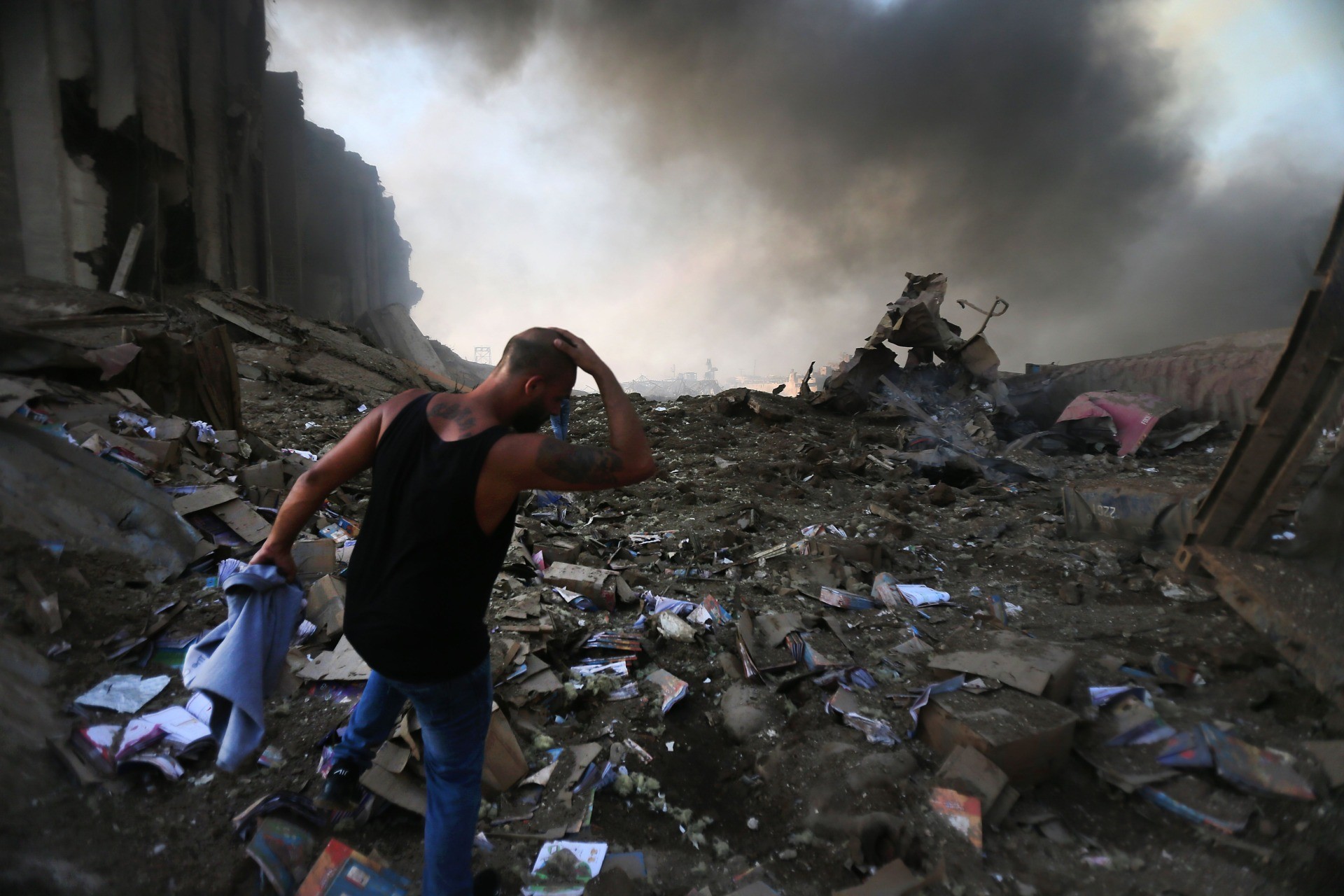
A man makes his way through the wreckage of an explosion at the port in the Lebanese capital Beirut on August 4, 2020. (STR/AFP via Getty Images)
Yet even amidst the chaos and carnage, the Lebanese pulled together.
“In a land conditioned by calamity, people knew what to do, including helping wounded people they didn’t know,” writes Vivian Yee, the New York Times correspondent in Beirut.
Yee, who was injured by the blast, said, “[T]he Lebanese who would help me in the hours to come had the heartbreaking steadiness that comes from having lived through countless previous disasters. Nearly all of them were strangers, yet they treated me like a friend.”
“Someone passing on a motorbike saw my bloody face and told me to hop on. When we couldn’t get any closer to the hospital, our way blocked by hillocks of broken glass and stranded cars, I got off and started walking,” Yee said.
“Survivors walked by, moving faster than the jammed-up traffic. To anyone who appeared unhurt, people called out, ‘alhamdulillah al-salama,’ or, roughly translated, thank God for your safety,” she said. “Before the end of the night, after my co-workers had found me, after a passing driver named Ralph had offered to take us to one of the few hospitals still accepting patients, after a doctor had put 11 staples in my forehead and another sprinkling on my leg and arms, people would be saying the same thing to me: Thank God for your safety.”
That spirit of forbearance, with all its grace and defiance, has come to define Beirut.
Like the phoenix, this ancient Phoenician city has risen from the ashes again and again, surviving civil wars, famines, and conquests. It has witnessed the rise and fall of empires and bears the ruins of their passing.
Just north of Beirut, there is a river called Nahr al-Kalb that runs from Mount Lebanon to the Mediterranean Sea. The limestone bluff rising from the river’s mouth bears 25 centuries of inscriptions from armies that passed through this land and left behind a memorial etched into the rock. From the hieroglyphics of Egypt’s Ramses II to the cuneiform of Babylon’s Nebuchadnezzar II, the Latin of Roman Emperor Caracalla’s Third Gallic Legion, the Greek of the Byzantine governor of Phoenicia, the Arabic of the Mamluk Sultan Barquq and Ottoman Fakhr-al-Din II, the French of Napoleon III, the English and French of Allied armies during World War I and World War II, the Arabic of the Republic of Lebanon celebrating its independence in 1943 – all are carved into the rocky cliffs overlooking the Mediterranean, a silent monument to Lebanon’s ability to withstand history’s travails.
The legendary Lebanese singer Fairuz immortalized Beirut’s legacy of tragedy and endurance in the lyrics of “Li Beirut” (“To Beirut”), her famous love song to the city written during Lebanon’s civil war.
Beirut, she sings, has “a glory made of ashes”:
To Beirut – a greeting of peace with all my heart,
And kisses to the sea and houses,
To the rock (in the harbor) that looks like an old sailor’s face.
From the soul of her people, she makes wine.
From their sweat, she makes bread and jasmine.
So how did it come to taste of smoke and fire?
Rebecca Mansour is a Senior Editor-at-Large for Breitbart News. Follow her on Twitter at @RAMansour.
The Associated Press contributed to this article.
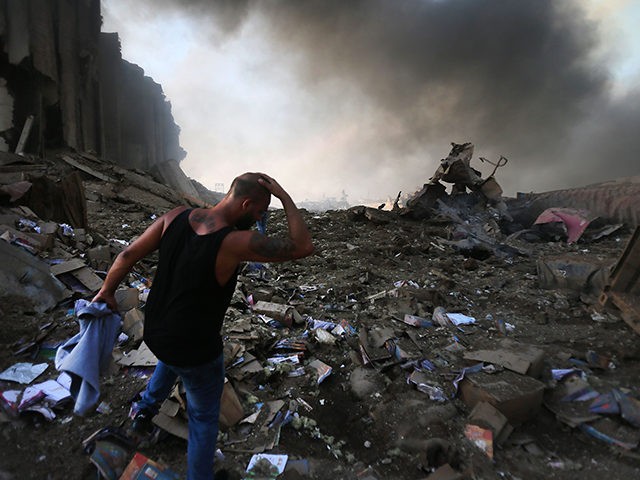
COMMENTS
Please let us know if you're having issues with commenting.